#this is the most protagonist centered morality based story i have EVER read
Explore tagged Tumblr posts
Text
Going feral over the fact that Zeus's plan for taking care of a child he knew he couldn't properly care for was 100% better for everyone involved than how Hades took care of Thanatos, and yet Zeus is apparently the bad guy for this.
#this is the most protagonist centered morality based story i have EVER read#i'm saying stuff#lore olympus spoilers#anti lore olympus#lore olympus critical
38 notes
·
View notes
Text
Ranking all the OI and manhwa I've read part 2: the moderate.
The decent stories. Just a little better than average
The tyrants only perfumer
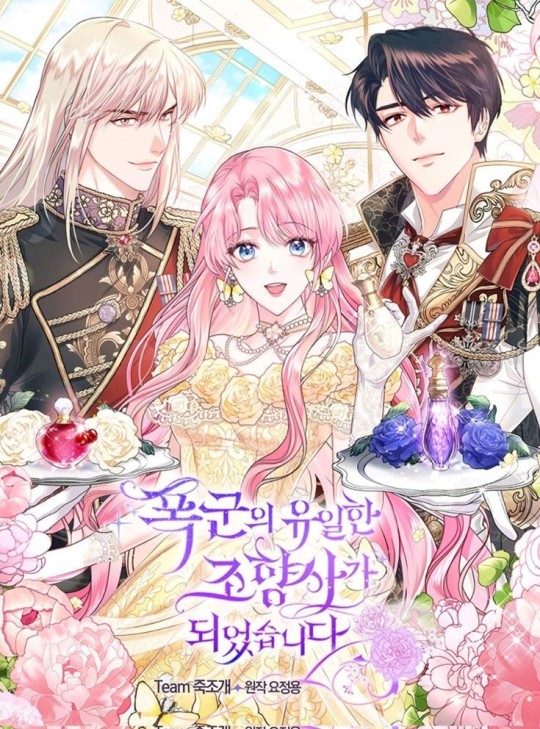
My favorite fast food webcomic to this very day. It's characters are tolerable and there's just something some satisfying looking at the perfume bottles, the little bottles remind me of those DIY kits they'd sell at target. That being said it's still a fast food manhwa, the characters are flat, the plot goes too quick and the villains are easily defeated so as much as I enjoy it when I just want to read something quick and light, it's not a good option for something more serious.
The empress wants to avoid the Emperor.
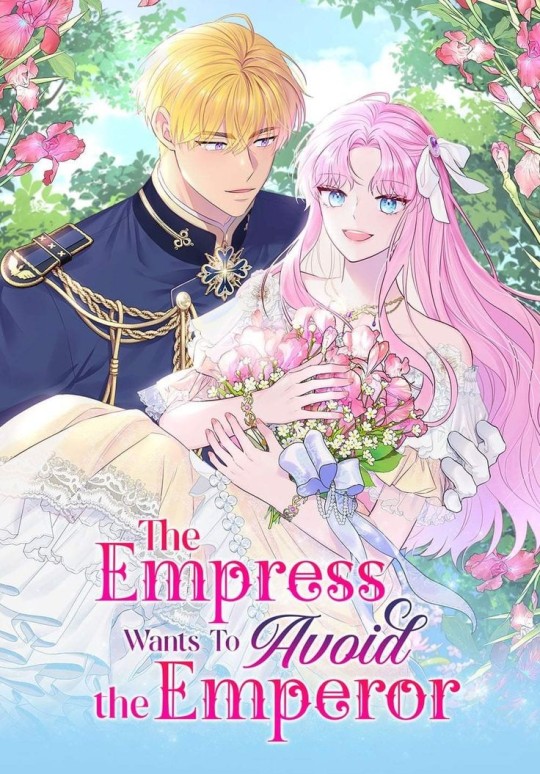
This was actually one of my very first manhwas I've ever read. I thought it was one of the greatest stories ever told when I was still in my revenge phase and it's definitely not terrible when I reread but it's not the greatest piece of literature either. Still for a basic revenge story at least Louise actually gets away her fuckass husband.
Tears of a withered flower
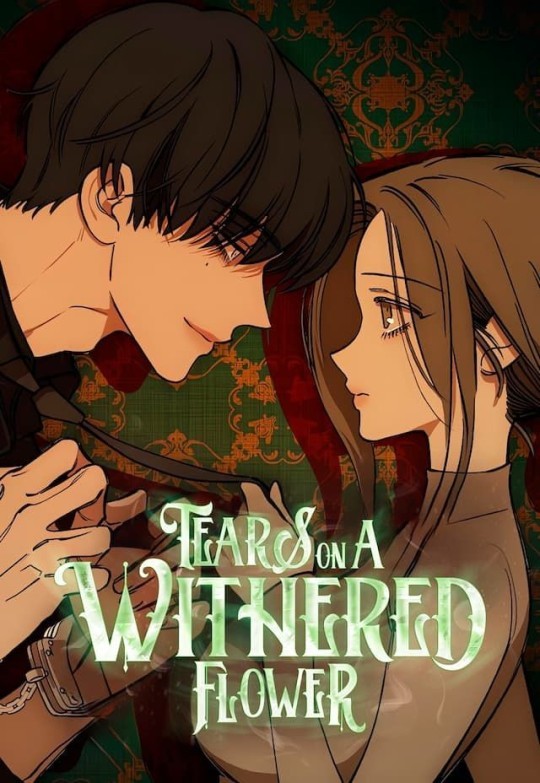
I like it, just not as much as everyone else likes it. I've already made a few posts on it and my current opinions still stay the same but besides all the self insert this and the predictable that the dialog definitely improves from cartoony to poetic. I'm just hoping the rampant misogyny problem in TOAWF is only a fandom problem and not something the author is planning on incorporating into every other woman that isn't Hae Soo
I will divorce the female leads brother
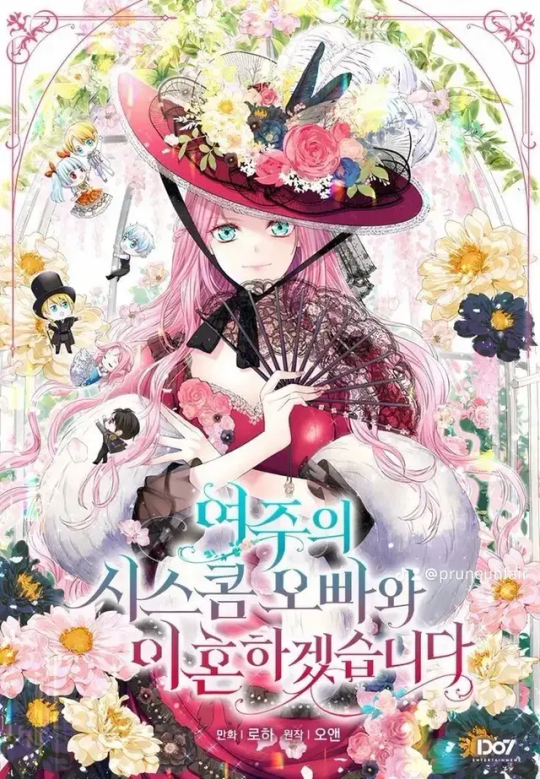
Okay I won't lie this one is kinda funny given how it calls out the absurdity of protagonist centered morality in a better way. Ethel as a protagonist is okay as protagonists go and while the villains are played off as stupid thats because the story actually plays into how idiotic they are instead of claiming they are the smartest around when they aren't, specifically the brothers and father. Also the Og fl of this one has by far the ugliest designs I've ever seen. It's the kind of design where you can tell the artist did not like her at all and gave her the Miku special with those unflattering color combos. I think the weirdest part is the implied incestuous feelings the family has for Reina but once again, it's meant to be seen as vile so it gets a little pass.
Into the light once again
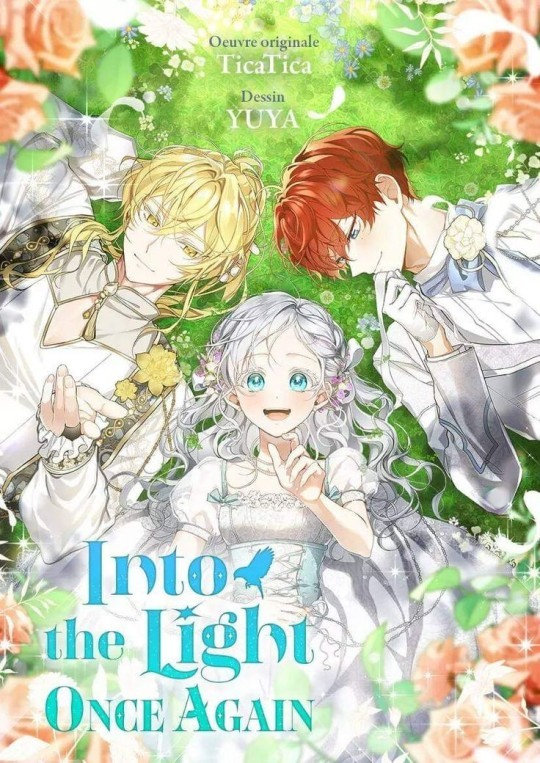
The pain I went through when I realized the 14 year old Aisha was being paired up with guys way to old her with this one because it was so good before it just ruined what could've been 😔. Outside of the obvious I adore both Aisha and Marianne as polar opposites and characters that aren't immediately nice or honesty to Aisha aren't put to death, for the most part at least, they are allowed to grow as better people and get character development. The magic system is pretty easy to remember though I think Aisha can sometimes get too deep in her "super powerful nice girl" archetype but it's not to the point of being awful.
The empresses lipstick
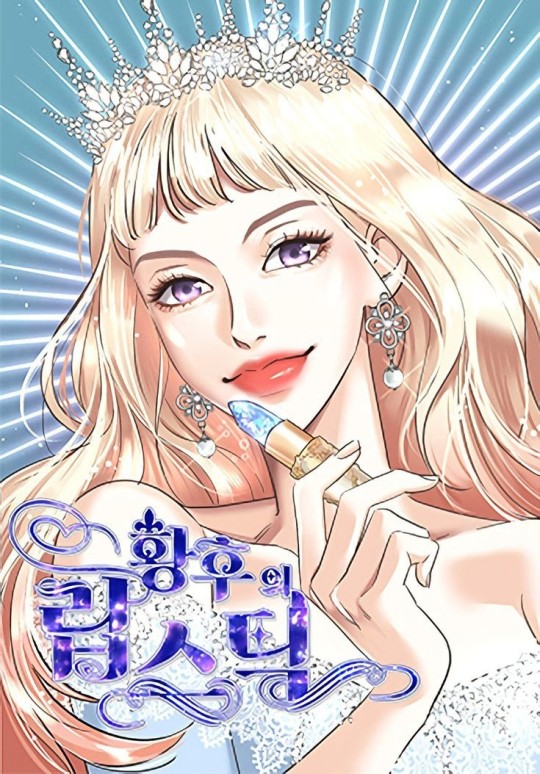
more of a comedy than a traditional rofan but it works, it's one of the first I've seen to get the rococo style a little bit better than others. (It's still not the greatest accuracy but since it's meant to be silly it has more leeway) however it sadly is brought down by the fact that Jane is heavily implied to be on the younger side when her mom bugs her about school and implies that she'll be going INTO high-school implying she's 15-16 based on Korean school systems and she's already being paired up to marry male leads older than her.. damn you age gap trope and damn you 18th century for reminding me of gross yet true history. If it weren't for the fact that I can't remember anything about the ML's age this would be lower.
The villainess turns the hourglass.
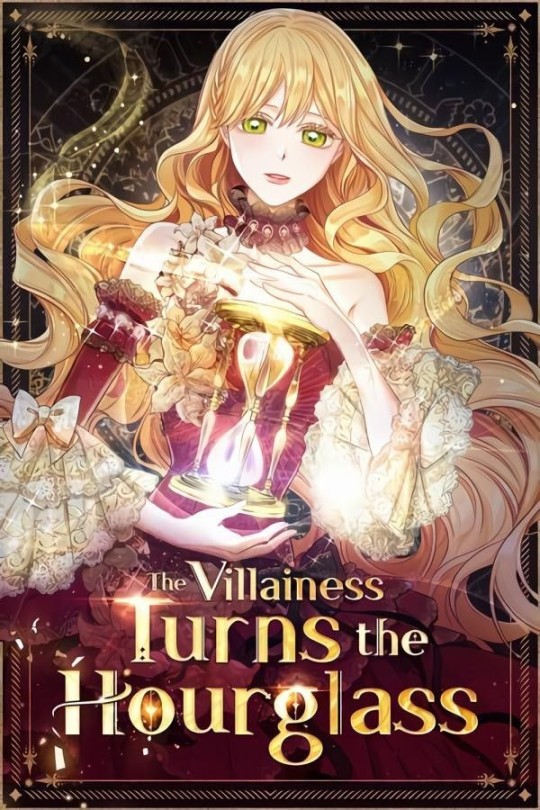
What I think of when someone asks me to think of the OG era for manhwa. The concept of the hourglass is easy to follow and it actually comes with a drawback so Aria can't be too overpowered, the bright colors make it all pop and having an actual villain for the FL in a villainess story ties it all in, people can complain about how awful she is but villainess is literally in the title so..you get what you bargained for. There are still cons though about it I don't care for, first of all I wish Mielle could be an actual threat so there would be a fun ongoing mental battle between two evil women, Isis and Mielle could've been smarter as a duo, Asher could've had a little more personality and the twist that Aria was actually of noble descent all along really killed the charm of her being a commoner who could prove she was just as smart as the aristocracy.
Perks of being the villainess
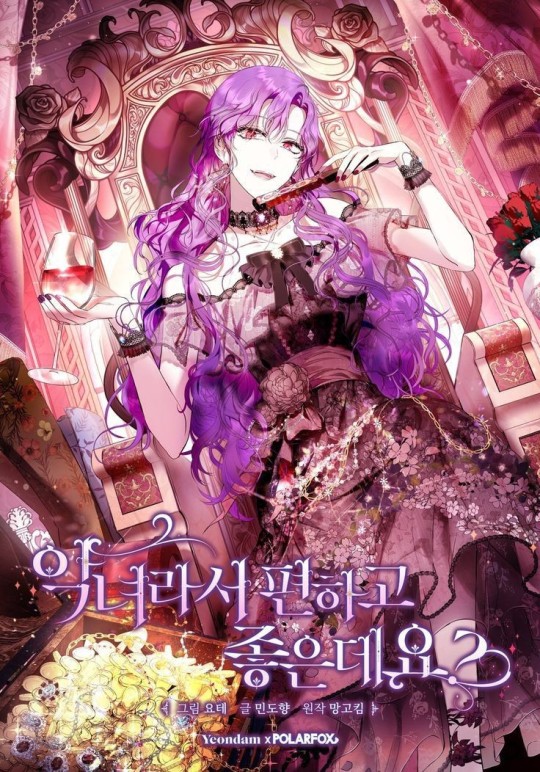
Deborah's already climbing up the ranks of one of the prettiest FL in my opinion because that shade of purple is DIVINE! The plots rather basic as most villainess manhwa tend to go. Deborah is hated by everyone except instead of a backstory claiming she's misunderstood, the og Deborah was actually an asshole to everyone she met except for Pilav so it gave her an actual obstacle. I do think some of them went too fast but I'm just glad we actually got to see the effort being done at all. I'll admit this was better then I thought so it moved up on my tier list. My only complaints are that the chapters can sometimes drag on and on to the point of being bottle episodes.
I shall master this family
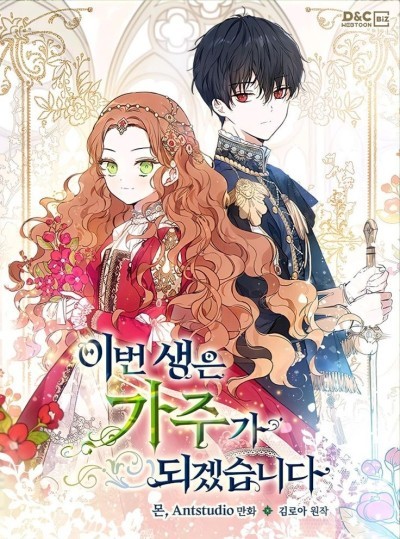
I would like this so much more but it drags on so much! Florentia was nice at first but as the chapters went on and on I was less impressed and just thinking "yeah this is just getting boring" with how many times you know she's gonna best her opponents, don't hate her but shes becoming a little too meh right now. That said I like reading it, definitely suffering from a overpowered MC that could use some work but when it comes to politics it's so much more interesting if you can get past that one major issue.
Pretty good: almost better then average but I either haven't read all of it to place it higher or if there's just better
I will become the villains poison taster
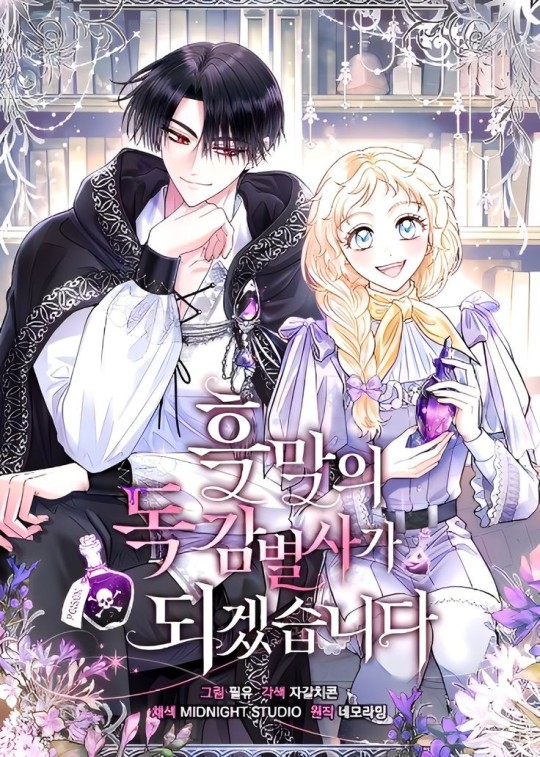
I love my underrated girlie's ✊️ the plot is certainly unique, Giselle has the strange of ability of being not only immune to poison but the poison also tastes like fruity snacks/drinks. It deserves a little more traction then what it gets, the ML Reniel actually has emotions instead of stoicism plus actual critical thinking skills because the FL acts nothing like the OG villainess and Giselle, despite how it may seem, isn't the born sexy yesterday trope, she's just allowed to be a sweet heart while still being a person. It's not much but it's still pretty good.
Serena
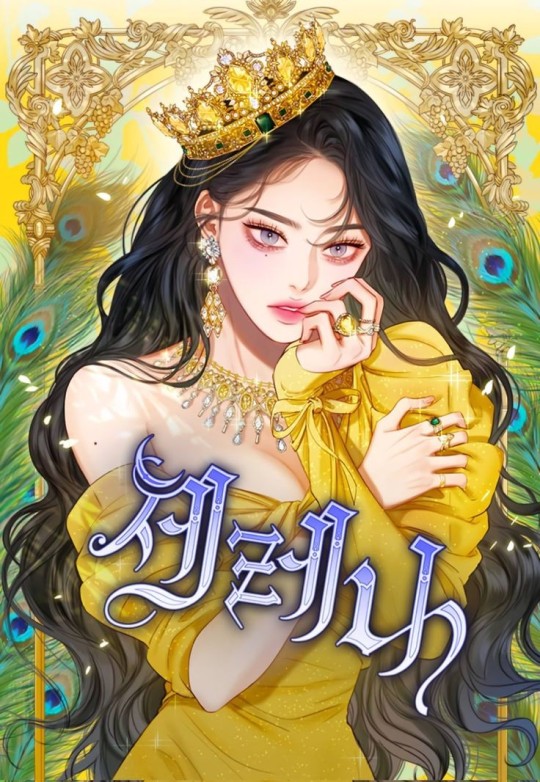
Fashion and character designs are absolute peak but plot comes before art. At first I was pretty harsh on Serena but when I actually read more of it to form a more concrete opinion I realized it's not the worst and actually got a little entertaining. As a FL Serena isn't bad, I like that she comes across as a nepo baby who needs to work hard to uphold her predecessors legacy so we have flaws to work with here and at the very least the story seems to be kinda self aware that Serena isn't a terrific person. It's also a drama not a romance so while I don't like either Eiser or Frederick as love interests at least Serena can say the romance isn't supposed to be the center of the plot.
Your throne
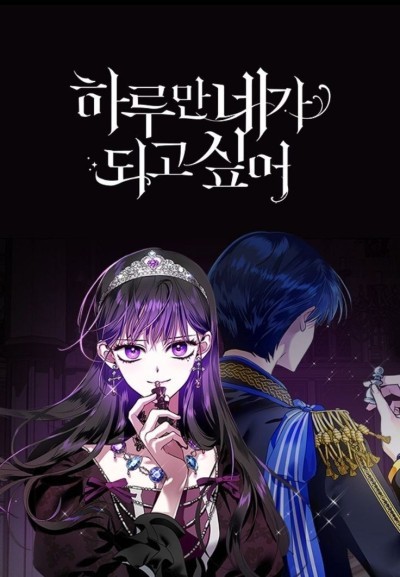
After so many people telling me how good it was I finally caved in and began reading last week but I already got spoiled so I know most of what happens. Obviously I like the fact that Medea and Psyche actually team up instead of hating eachother and even though it's through spoilers Psyche is my favorite. It's so dang long though it's probably gonna be a while before I make any your throne related posts. Only cons is it can sometimes get too boring to follow.
Seducing the villains father
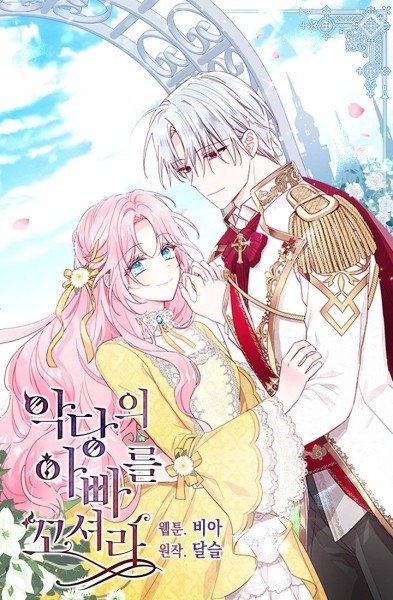
Proof you can make a stereotypical rofan and it can still work. Yerenica is the perfect balance of girl failure and likeability where her flaws are very common for most people and yes while she is kinda dumb she's not so dumb it makes me wanna slam my head against the wall. Erudian is pretty good as ML's are concerned, just a tad basic and the villain Soleia isn't dumbed down either. Love the second half of the story which gives a little more focus on Yenis family instead of just her love life and while it does get cringe inducing and the plot tracks off from time to time, I still like it.
The crownless queen
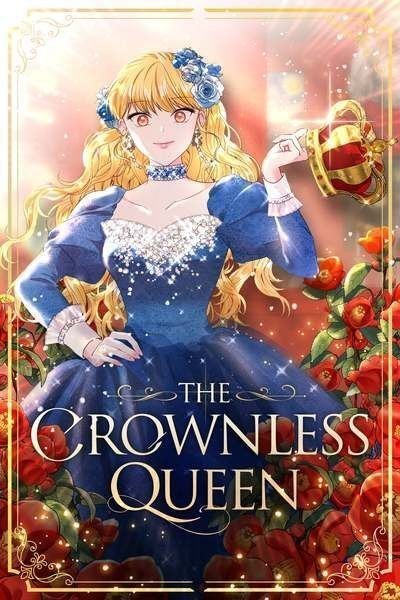
The FL is a recently retired history expert who transmigrated in her daughters inaccurate novel and because of those inaccuracies, there are new problems to face while Delia has to survive in a world where Barons and Dukes are switched and she has to climb to social latter. There's little things that really prove how much thought was put into it (such as Delia not knowing the exact date in time shes set in since she's in a different world)
Beware of the villainess.
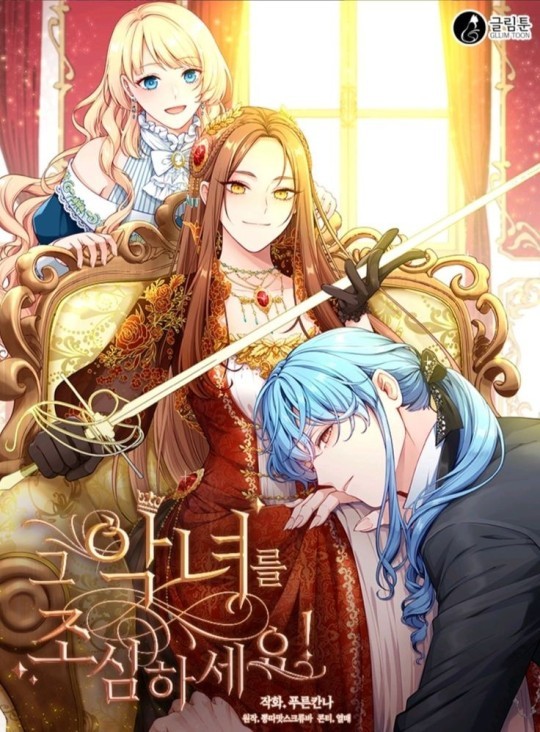
A little similar to your throne but it keeps my attention longer then the former. Once again women working together instead of being forced into enemies! Really like that! The Yuri baiting though? Boo 👎, don't tease the audience like that (especially considering the og fl is literally called Yuri) can be over the top but I think that's what makes it stand out, it means to be funny and in your face with Melissa's antics but the best character by far is Yona, home girl just wants that check and I can understand that feeling.
Another typical fantasy romance
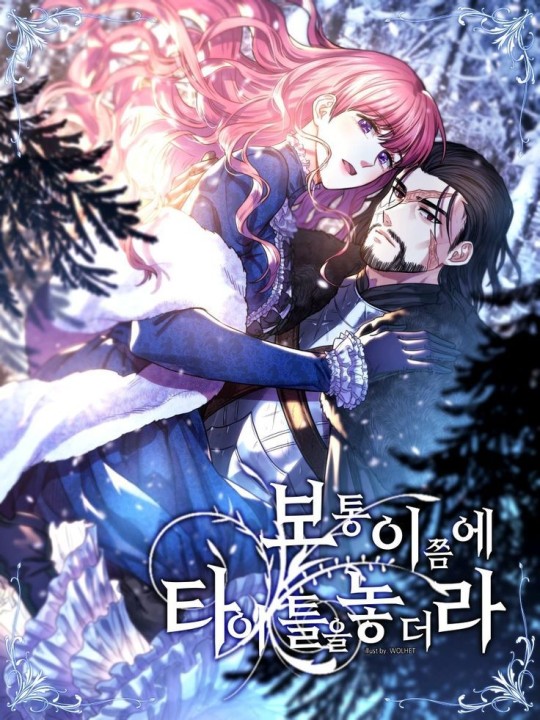
I gotta stop procrastinating and finish this one!! 😭 first off, Pellus is my 2nd favorite ML with his design being my number 1 favorite in terms of character design. For once we have an actual cold duke who accurately looks intimidating instead of basic BTS member. Best part though: it is one of the greenest of green flag relationships to the point where Lithera and Pellus are worthy candidates to face off Pereshati and Therdeo in terms of who's the best manhwa couple. Actual communication instead of miscommunication that goes on for chapters, relationship actually has steady progression that's just in the middle of how they get to together and Lithera is a great FL. Then I found a bunch of other manhwa and forgot about this one until it came up in my head while I made my first tier list. It'll probably go up once I complete the story.
This one took longer then I expected but part 2 is finally out and now I have to start rereading for part 3.
#the tyrants only perfumer#The empresses wants to avoid the emperor#tears on a withered flower#I will divorce the female leads older brother#into the light once again#The empresses lipstick#the villainess turns the hourglass#the villainess reverses the hourglass#the perks of being a villainess#i shall master this family#I will become the villains poison taste tester#Serena#your throne#seducing the villains father#The crownless queen#beware of the villainess#another typical fantasy romance#ranking#manhwa#webtoon#tapas
45 notes
·
View notes
Text
Dear Evan Hansen
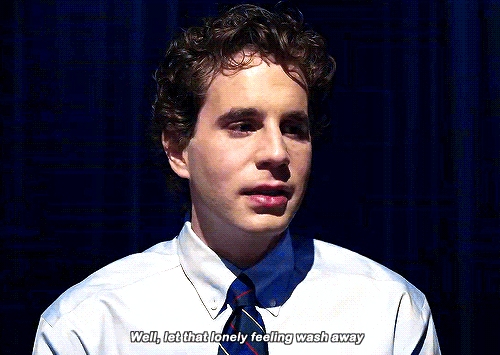
You may have seen some ~online discourse~ about the film Dear Evan Hansen, an adaptation of the 2016 Broadway musical, and you might have wondered what all the hubbub is about. I mean, it’s a feel good story about a senior in high school, Evan Hansen (Ben Platt), who has some pretty severe anxiety and depression. While trying to fulfill an assignment from his therapist to write a letter to himself, his letter gets picked up by another student, Connor (Colton Ryan) - and later that day, Connor kills himself. Connor’s grieving parents and sister Zoe (Amy Adams, Danny Pino, and Kaitlyn Dever) are desperate to learn more from the boy they think was Connor’s best friend - after all, Connor’s suicide note was a letter addressed to “Dear Evan Hansen.” And, as you can imagine, Evan tells them about the unfortunate mistake and sits with them in their grief as they struggle to pick up the pieces of their lives.
Just kidding! He lies to them, repeatedly, elaborately, expansively for months, constructing an entire false friendship with Connor that never happened, and ingratiating himself into the wealthy nuclear family he never had, in large part because he wants to get into Zoe’s pants! THIS IS THE PROTAGONIST OF THE STORY. Oh, and it’s a musical so there is a lot of singing and crying and singing WHILE crying and sometimes crying and not singing at all. But the #inspiration, you guys.
Things I liked:
Pretty much everything but the story and Ben Platt’s performance. The supporting cast is stacked, and all of them do a great job at elevating material scraped directly out of a diaper worn by someone who just chewed their way through a copy of the DSM-5.
A couple of the songs are damn catchy - “Waving Through a Window” and “You Will Be Found” are standouts for a reason - and here’s the thing, Platt sings them well. But as you’ll discover, there’s a lot more to a movie musical than just singing your part.
Stephen Chbosky, the man behind every deep thought I and a lot of people in my generation had in 2006 after he wrote The Perks of Being a Wallflower, is a pretty good director. I particularly enjoyed the fanvid-type cuts in “Waving Through a Window” in conjunction with the lyrics, and his use of interstitial shots to flashbacks (and sometimes flashforwards!) is a neat little bit of shorthand that I thought was used sparingly enough to be effective.
Amy Fucking Adams. She’s holding on so hard, so desperately to the idea of who her son could have been, rather than the reality of who he was, and she is full of such deep pain that is masked by an almost endless supply of patience with Evan and relentless positivity. All this made me want was Enchanted 2 even worse than I already did.
Super into everything Zoe wears - the costuming department did a great job, and now all I want to do is live in mom jeans and baggy sweaters.
Did I Cry? I teared up a couple of times because I’m not a completely heartless bastard and when Amy Adams offered Evan Connor’s college money, my heart broke for the lie Evan had thrust upon her, and Julianne Moore’s song got me good, because she’s just a single mom to Evan who is doing her goddamn best.
Things I hated more than the time I dropped a frozen gallon container of fruit cocktail on my pinkie toe in my parents’ garage and it turned black and I thought it was gonna fall off:
Ben Platt is 28 years old. He originated the role of Evan Hansen on Broadway, so in many respects it makes sense that he plays the role in the movie, except for the one kinda sorta important thing where he looks like a wizened old crone standing amongst a sea of children doing his best twitching, cringing Hunchback of Notre Dame impression. If you want someone to convincingly play 20 years their junior, hire Paul Rudd. Otherwise, please don’t ask me to believe that this supposed 18-year-old has crow’s feet.
And that twitching nervous energy is a huge part of the black hole at the center of this film - he’s playing to the cheap seats and walking through the halls of his high school like a wet chihuahua. It’s an excruciating acting choice to watch - he doesn’t just have anxiety, he is on the verge of a nervous breakdown seemingly every second of every day. Like honestly, where is only-mentioned-never-seen Dr. Sherman, because this young man’s meds are NOT WORKING DR. SHERMAN.
There’s such a lack of self-awareness on behalf of the writing, directing, and performance by Platt. There’s one song, “Sincerely, Me,” that offers the only glimpse of commentary about what Evan is doing, by pointing out the malicious ridiculousness of him writing a series of fake emails as proof of his and Connor’s friendship.
Also what high schoolers email this much?? I know this was written in probably 2014 or so, but has a bitch never heard of a text? Even a DM? This whole plot is constructed around the premise that high schoolers are just constantly, constantly emailing each other.
Everything - and I mean EV-ER-Y-THING - about Evan’s relationship with Zoe is so creepy and disturbing that with a soundtrack change, this could easily be a horror movie. He attempts to get her to like him by describing to her all the things her brother noticed about her - oh wait, I’m sorry, all the things HE noticed about her while he was skulking in the shadows following her around for years, watching every move she made, and it ends with him singing repeatedly “I LOVE YOU” because following a girl around and never having a conversation with her or knowing her at all is love, right? This was clearly written by the same people who chose “Every Breath You Take” as their wedding song because Sting is hot and they never actually listened to the damn words.
And it gets about 10 billion times worse when Zoe goes to Evan’s house alone, takes him up to his room, and sings “I don’t need reasons to want you” and that was the moment I was that person I hate in a movie theater and I pulled out my phone to Google who wrote the music and lyrics to the musical (we were in the back row of the theater no one was behind me THIS WAS AN OUTRAGE EMERGENCY) and of motherfucking course it was written by Benj Pasek and Justin Paul, 2 men who heard about meeting an actual human woman from a friend one time but otherwise are unfamiliar with the concept.
Lastly, enormous serial killer vibes from Evan sending unlabeled flash drives anonymously through the mail with no note in an attempt to right his wrongs. That’s not catharsis, that’s how the next installment in the Saw franchise starts, with Evan in a Billy the clown doll mask showing up on the screen and asking if you want to play a fucking game.
Also, I know it’s not possible for the narrative to justify this in a way that could be satisfying based on Evan’s actions, but what is with this thing where single working-class mom Julianne Moore is turning down rich people’s money for Evan to go to college? Like, obviously we can’t have that happen in the movie but in real life, fuck your pride! Take those rich people’s money!
I also know how movies work but nothing annoys me more than a giant group of high schoolers all getting beeps and boops to indicate text notifications all at the same time because I don’t know a single person under the age of 55 who keeps their ringer on. That shit is on vibrate AT MOST, and I feel like that’s a millennial thing.
The emotional climax of the film is obviously Evan’s WAY TOO LATE confession, but the idea that it’s prompted by Connor’s family suddenly getting a lot of internet hate is, frankly, laughable. If Sandy Hook taught me one thing, it is that no tragedy is immune from trolls who live only to cause other people devastating emotional pain on the internet. That shit starts day 1. Apparently no one involved in this production has ever been on Twitter?
Also it feels like there should have been a dog somewhere in this movie and there was no dog, so points off for that too.
Perhaps Dear Evan Hansen isn’t nearly as deep as it aspires to be. Perhaps it’s a morality play, a simplistic message of “Don’t lie, kids, lying is bad!” Major studio movies wrap themselves up with a nice bow at the end so everyone can feel good about themselves and leave with a happy ending, but the moronic cruelty on display here makes that feat feel impossible. We’re left with Evan in an orchard, reading Connor’s favorite books and staring into the big blue sky with all the self-actualization he’s earned now as a lil treat. And if Evan Hansen looked like an actual 18-year-old, it would be a lot easier to extend more empathy to him and his not-fully-developed prefrontal cortex, but it’s a little harder with this fully-grown, weathered man who was old enough to remember seeing Liar Liar in theaters.
Dear Evan Hansen,
Get some actual help and a haircut and maybe you can grow up enough to have an actual healthy interaction with any other living person, ever.
Sincerely,
Me
If you liked this review, please consider reblogging or subscribing to my Patreon! For as low as $1, you can access bonus content and movie reviews, or even request that I review any movie of your choice.
#121in2021#dear evan hansen#dear evan hansen review#dear evan hansen 2021#ben platt#amy adams#kaitlyn dever#julianne moore#colton ryan#danny pino#movie reviews#film reviews
87 notes
·
View notes
Text
Max Goodwin and Randall Pearson: The Well-Meaning, Incredibly Self-Centered Leading Men We’ve Grown to Love.
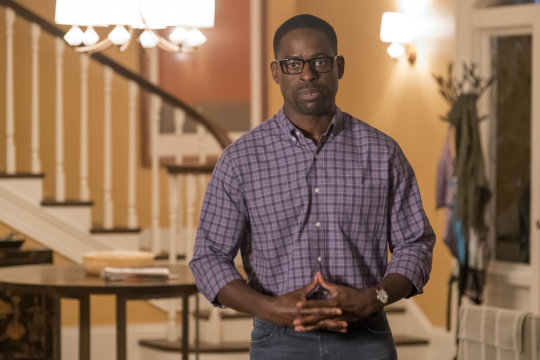

Hey fam! Like I said, I’ve been writing a ton of meta lately and this is another one that’s just been sitting in my drafts. It’s basically a This Is Us and a New Amsterdam meta which is something I haven’t done before but something I want do more of. In my Game of Thrones days I used to write a lot of meta about shows and characters that had similarities so this is fun for me. I hope y’all enjoy this. ALSO THIS HAS SPOILERS FOR BOTH SHOWS!!!!!!!
Without a doubt the two most popular shows on NBC is This is Us and New Amsterdam. And what’s not to love? They’re both emotionally driven, heartfelt, shows that focus on incredibly deep and complex topics. Though one show focuses on family dynamics and the other focuses on the healthcare system, these shows are very similar in more ways than one. Case in point, Max Goodwin and Randall Pearson. The more I watch these two shows, the more I realize how these two characters are so alike!!! These two men are kind-hearted, well intentioned, individuals who genuinely want to make some sort of positive difference. They are incredibly ambitious and always have “bright ideas” and “goals” they want to accomplish and somehow they’re able to meet those goals without ever having to sacrifice their wants and needs. By every definition these men are the “main characters” or the ultimate “protagonists.” These are the folks that we are supposed to root for. At the same time, though these men have many traits to be admired, when you truly look at it both of them can be incredibly self centered and selfish especially when it pertains to their romantic partners and love interests. No matter how appealing you make these characters out to be these men clearly fall under the Behind Every Great Man trope.
The Behind Every Great Man trope has been used countless of times throughout Cinema and TV History that I’m sure that I don’t even have to explain it to you but for the sake of this meta this is how it’s defined.
“Behind Every Great Man...stands an even greater woman! Or in about a hundred variations is a Stock Phrase referring to how people rarely achieve greatness without support structures that go generally unappreciated, and said support structure is a traditionally female role via being the wife, mother, or sometimes another relation. This trope is specifically about a man who is credited with something important, but owes much of his success to the woman in his life.”
This trope usually has a negative connotation (and rightfully so) because the man who often benefits from this is an asshole and unworthy of this type of support!
For example:
Oliva and Fitz
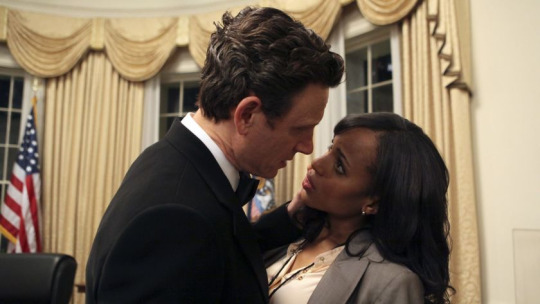
Cristina Yang and Burke
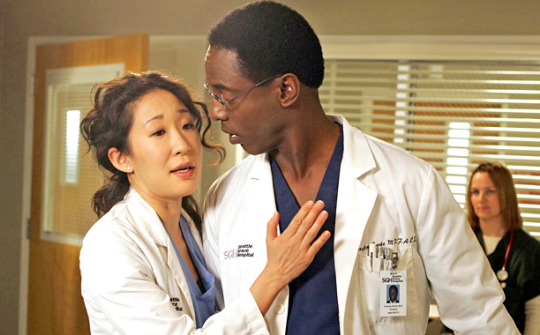
Cookie and Lucious
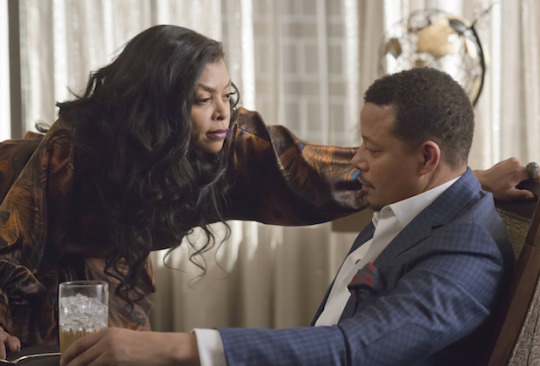
Ghost and Tasha
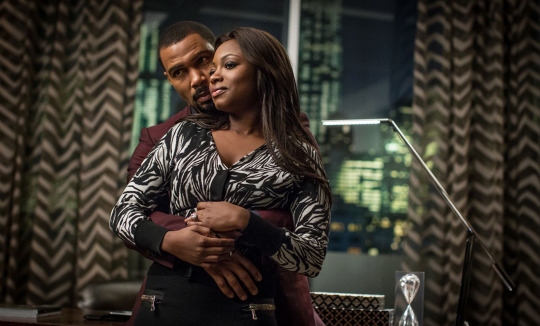
There are countless others but these are a few of the couples that come to mind for me. Randall and Max aren’t comparable to any of these men that are listed above but they are still operating under the same trope. It just looks nicer because Max and Randall are inherently good and inspirational. They are the heroes of the story. I would even argue and say that both men fall under the Chronic Hero Syndrome trope which is defined as
“Chronic Hero Syndrome is an "affliction" of cleaner heroes where for them, every wrong within earshot must be righted, and everyone in need must be helped, preferably by Our Hero themself. While certainly admirable, this may have a few negative side-effects on the hero and those around them. Such heroes could wear themselves out in their attempts to help everyone or become distraught and blame themselves for the one time that they're unable to save the day. Spending so much time and effort saving everyone else can also put a strain on the hero's personal or dating life.”
Just because Max and Randall have these incredibly inspiring aspirations, is it fair that their wives and love interests are always expected to rise to the occasion and support them. Is it ok for their partners to continuously sacrifice their wants and needs because they love these men?
Let’s dive into it.
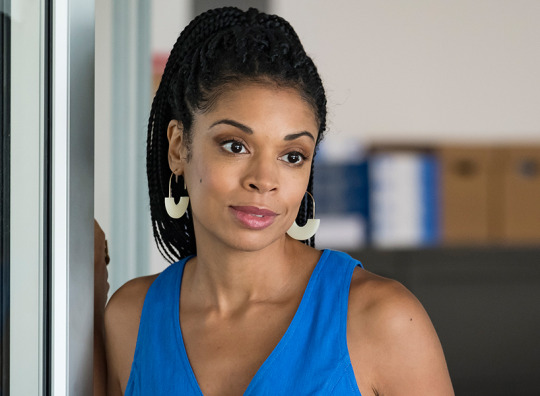
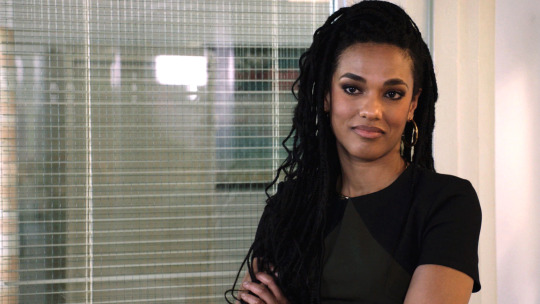
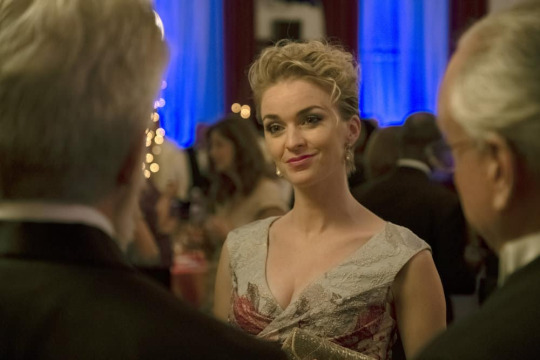
Truth be told, Beth Pearson, Helen Sharpe and Georgia Goodwin had to endure a GREAT DEAL to emotionally support the dreams and aspirations of these men while sacrificing so much of themselves in the process. In media we often see women sacrificing so much of their wants and needs out of love for these male leads and rarely do men do the same thing for their romantic partners and love interests. All three of these women clearly fall under the Act of True Love trope defined as
“The Act of True Love proves beyond doubt that you are ready to put your loved one's interests before your own, that you are truly loyal and devoted to them. Usually this involves a sacrifice on your part, at the very least a considerable effort and/or a great risk. The action must be motivated, not by morals or principle or expectation of future reward, but by sheer personal affection.When your beloved is in dire need of your help, or in great danger, and you do something, at great expense to yourself, for the sake of their safety, their welfare, or their happiness, thus proving beyond any doubt that you put their interest ahead of yours.”
Over the past few seasons we have seen all three of these women truly live up to this trope without any true consequences or accountability from the men they’re making all these sacrifices for. For example, in Beth and Randall’s marriage, how many times did Randall spring an idea on Beth without truly talking to her or considering her wants first? Everyone thinks these two are an ideal couple but she has endured A LOT for Randall.
Randall has spontaneously quit his job, moved his dying biological dad into their home, bought his biological dad’s old apartment building, fostered and adopted a child and also ran for city councilman outside of his district. In all of these decisions, Randall “consulted” Beth about it but at the same time didn’t really consult her. In a way there has always been this expectation of Beth to just go along for the ride with what Randall wants. Is anyone else exhausted from reading that list?! That’s a lot for partner to endure and lovingly support. But Beth has endured and has been Randall’s rock through it all!!! What worries me is that the one time Beth spoke out about her wants and needs of pursuing dance again, he couldn’t match the same energy she was giving him and eventually it led to world war three between them. Though things are looking up in their relationship and he’s starting to support her more, has Randall nearly given to Beth as much as she’s given to him? Absolutely not!
Similar to Randall, Max also had a wife who was a dancer. in fact, she was a prima ballerina. Unlike Randall and Beth, Max relationship with Georgia was rocky from the start. When we were first introduced to them Max and Georgia were separated and rightfully so. Georgia was never Max’s first priority. The hospital always came first in their relationship. He couldn’t even dedicate a full night to her for their proposal. In order to “save” their marriage they decide to have a baby and they both committed to taking a step back in their careers in order to do so. The problem was Max didn’t keep his side of their commitment and took a job to become the medical director at the biggest public hospital in the U.S. She gave up her career to start a family and he totally and completely betrayed her trust. So throughout season one we see them trying to rebuild their marriage but even in the midst of trying to rebuild a marriage based on trust and mutual respect Max still keeps things from Georgia. For several episodes he didn’t tell her that he had advance stages of throat cancer. He only told her when Georgia asked him to move back home. That’s fucked up! Then throughout their pregnancy he was never fully there for Georgia because he was either to preoccupied with the hospital or himself. At the end of it all, Georgia died tragically at the beginning of season two and really had nothing to show for it in her relationship with Max other than her daughter Luna.
Now let’s bring Helen Sharpe into the fold. While all of this stuff was going on with Max and his wife in season one, Max was developing a deep friendship, borderline emotional affair with Helen. Their relationship started out with Helen being his oncologist. As the new Medical Director of New Amsterdam, he swore Helen to secrecy about his diagnosis so that he could still run the hospital. Through that secrecy they eventually formed a deep bond but as his cancer got worse his secret was let out of the bag. He realistically needed someone to step up and run the hospital when he was going through chemo and though Helen already had commitments she stepped up and became his deputy medical director. Somewhere along the lines Max and Helen started developing feelings for each other. As Helen becomes aware of those feelings, she made a choice and decides to remove herself as Max’s doctor. He BITCHES about it but eventually accepts the boundary she’s clearly trying to set. Mind you, as this is unfolding, like Max, Helen is also in a new relationship with her boyfriend Panthaki. As Max’s cancer seems to be getting worse with his new doctor, she goes back on her boundary and decides to be his doctor again. This pisses her boyfriend off because he could already peep the vibe between them and he breaks up with her. When we get into season two, Max’s wife died and Helen set him up in a clinical trail (with a doctor she previously fired) that’s helping his cancer. Unbeknownst to Max, this doctor ends up holding his life saving treatment plan over Helen’s head and in order for his treatment to continue she gives this doctor half of her department!
Helen has sacrificed a lot for Max and now in season three she’s finally prioritizing her current wants and needs first! Like Randall, Max is starting to turn a page and is starting to support Helen and truly listen to the wants and needs that she has. All of this is good but my question is did any of these women have to sacrifice so much for the men in their lives to get a clue?
Why is it that this is a trope we see in media time and time and time again? Even if these men are good, why don’t we still keep these male characters accountable when they put their significant others in these situations that are clearly not fair? I’ve watched countless tv shows and I’ve seen a lot of tv couples but I think I have only come across one couple where the male counterpart has selflessly loved his significant other and has always put her needs above his own.
That character my friend is none other than PACEY WITTER
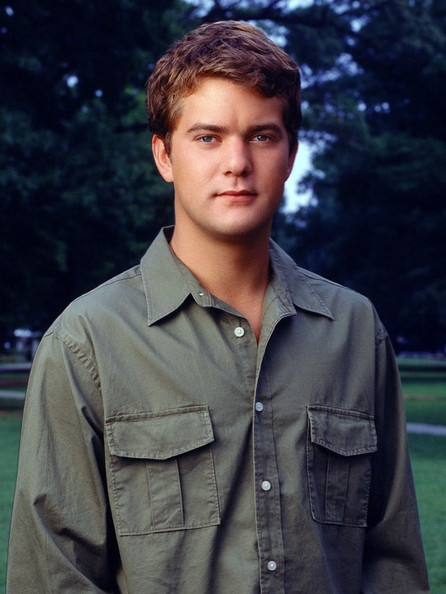
I might be mistaken but I think Joey and Pacey are the most popular ship in tv history and honestly, rightfully so! This is only example I can think of where the male in the relationship so willingly puts the wants and needs of his partner first. It is a completely selfless and sacrificial love. He never wants to hold her back and he never asks her to compromise her wants or needs for him. That’s why I think so many women love Pacey because in a sea of TV relationships, Pacey Witter is a fucking unicorn.
So to wrap this up does this mean that I hate Randall Pearson or Max Goodwin? No! I adore them. I love both of their characters so much. I just think that when we see the media continuously play out the sacrificial wife/love interest for the sake of their male counterparts, it should be called out. I’m all about sacrificial and selfless love but it should come from both sides.❤️❤️❤️
Anyway I hope y’all enjoy this! As always my DMs are opening here or on Twitter @oyindaodewale
#new amsterdam#sharpwin#This Is US#max goodwin#helen sharpe#randall pearson#beth pearson#georgia goodwin#pacey witter#joey x pacey#new amsterdam meta
90 notes
·
View notes
Note
Hi, I really love your thoughts and analysis on tts so I wanted to ask if you have read The Vanishing Village Book? It made me really think about Eugene's character. I sorta disliked him in the book and felt his relationship with Rapunzel was different and strained. I guess my question is if you think Eugene is a good character? I feel that I am biased for liking the story and relationship between Cassandra and Rapunzel so perhaps I am not seeing him in a fair light but there's just factors that make me feel he might not be the best for Rapunzel. I love their relationship and value & dedication towards each other but their relationship can feel a bit stale sometimes and Eugene can come off as not understanding and dismissive towards Rapunzel sometimes so ig I'd like to be proven wrong and be reminded that Eugene is good for Rapunzel
i have read vanishing village (and i remember liking it better than lost lagoon) but i have to admit i don’t remember anything but the very broad strokes of the plot, so i don’t feel equipped to do any analysis of eugene based on it; that being said -
i do really like eugene as a character in the sense that he is. interesting / engaging / compelling, which yeah to my mind that’s what makes a “good character” but also has nothing to do with the, kind of, moral or personal question of but is he a good guy or is he likable or sympathetic or that kind of thing. and on that my feelings are more ambivalent kfjfjdhs
on the one hand i do find his relationship with rapunzel in tts to be fairly refreshing. it’s nice to see a fictional m/f couple that is just… comfortable with each other, friends with each other, able to talk about their problems collaboratively with each other. that is so rare in fiction, where the tendency is so often to rely on miscommunication to manufacture relationship drama or do the will they won’t they, on again off again nonsense which is just so tiresome - and it feels good to have a m/f couple that eschews that altogether. and it’s also imo really nice that the m/f relationship fades so much into the background vis a vis the wider plot, which i know is not necessarily a popular opinion [vague gestures at all the ‘eugene was sidelined’ discourse] but, like, i feel like i can count on one hand the number of stories i know where the female protagonist *has a male love interest* without the story being ABOUT him, and with the male love interest filling this supportive narrative role while quietly and subtly dealing with his own problems on the side? it’s so difficult to find stories where men aren’t centered and so i appreciate eugene and new dream a lot for that reason too.
but at the same time like - eugene def falls victim to the plot-driven writing just like every other character does and that frustrates me because i think ultimately having all these loose threads hanging with him means his character feels a bit stagnant, and that in turn makes his flaws more glaring because they’re never… worked on or addressed, they just sort of persist or silently fade away for the most part. (which again, is true of literally every character because the storytelling of tts is highly plot driven and episodic)
& that phenomenon can make character interpretation a little convoluted, because… well the intentions of the narrative are signaled pretty baldly (eugene grows out of his selfishness and becomes a compassionate hard working leader for corona, which he has embraced as his home) without having much if any on-screen development to back it up (indeed the premise of flynnposter involves eugene shirking his new responsibilities, and then it concludes with a commitment from him to take the captain gig seriously - but thereafter the only time we get to see this demonstrated through him encouraging project obsidian [which makes him look the opposite of compassionate or responsible given he is excitedly planning to extrajudicially murder cassandra] and then joining the fight against zhan tiri [which literally everyone in corona does]). so do we take what the textual development shows us and conclude that eugene is, at the end of the day, just another cop, or do we take the narrative signaling as a given and fill in the textual gaps with our own imaginations? i tend to fall heavier on the textual side but i do try to take intentions into consideration when they are signaled so clearly, because i understand the structural and corporate limitations on what the tts team were able to do with the story.
anyways - i also have some fraught feelings about new dream because, in the film, it’s not a relationship that i can buy into at all. rapunzel is 17, a few days shy of 18, when an adult man in his mid-twenties tumbles into her bedroom, hits on her, tries to take advantage of her naïveté so he can recover his stolen goods and screw her over because he’s spent his life cultivating an attitude of selfish disregard for anyone but himself, but she’s so sweet he decides to give emotional vulnerability a try and within three days they’re in love and then they get MARRIED?? and he’s literally the first person rapunzel has ever met who wasn’t her “mother”? excuse me???
and i get the impression the tts team was fully cognizant of that problem and made a real effort to address it, as much as they could within the context of the designated disney princess couple - that’s how we get things like the BEA proposal and rapunzel and eugene talking their feelings out afterwards and agreeing to take things slower, and that’s how we get things like rapunzel having cass and eugene having lance so they have lives and identities and relationships outside of each other, and it’s why eugene has a little arc of becoming less self-absorbed in the front half of s1 and why cassandra overtly criticizes his treatment of rapunzel in BEA and so on and so forth. like no one says it OUT LOUD in the series but rapunzel’s and eugene’s relationship is fraught with peril because of the way they met and came together, and it takes significant emotional work from both of them to navigate that to arrive at a healthy place, and i enjoy watching that play out.
so yeah eugene is sometimes too in his own head to notice when something is wrong with rapunzel, like how he misses how unhappy she is in BEA because *he’s* so jazzed about palace living, and sometimes they struggle to get on the same page with each other in general; but that’s just, kind of the gig where relationships are concerned. what matters to me is that whenever these hiccups happen we see, typically some confusion or distress from him or rapunzel or both, and then they reach out for each other and talk about it until they reach an understanding, which is the correct healthy way to manage this sort of conflict in a relationship. and of course through it all eugene is pretty unflagging in his absolute support of rapunzel - even if he doesn’t always *express it* in a good way, he is always very invested in rapunzel’s happiness and well-being. like even the BEA proposal, eugene’s fuck up lies in assuming that rapunzel felt the same way he did about everything and that proposing now would make her happy - there’s self-absorption there but not to the point where he isn’t concerned about her feelings, so when he upsets her he immediately realizes that he screwed up and shelves his own feelings to focus on hers, which is very Good Partner of him.
and then again on a metatextual level i do kind of hate that rapunzel’s arc is essentially, trapped in corona -> adventure! -> adventure is traumatic time to go home -> exact same circumstances she started in but she’s happy about it now. not to say i object to rapunzel embracing her role as a princess/queen per se, but in an ideal world i would like that to come from a place of rapunzel remaking her role to suit herself rather than just kind of… this ‘well got the wanderlust out of my system forever!’ vibe i get from plus est. this isn’t directly related to eugene at all but i think it does splash over onto him on account of him being so closely intertwined with her life in corona. if rapunzel were given an arc about tearing down institutions that stifled her in s1 and really rebuilding corona to be better (something that is lightly implied in canon but never quite makes its way to outright text) then of course eugene would have been her number one supporter - but she doesn’t get that arc and so eugene ends up just kind of being there while rapunzel settles into the role laid out for her. (the destiny narrative being played painfully straight in this regard doesn’t help either.)
this is all a bit of a ramble but i guess what i’m getting at is i think at the end of the day the thing that makes new dream feel a bit stale or stagnant is the series sticking to this aggressively pro-monarchy, status quo is good, mass market appeal narrative enforced by the reality of Disney Princess Show, and that’s not eugene’s fault or any character’s fault, it’s a corporate issue and writing issue.
oh and also personally i think eugene’s biggest flaw in the new dream relationship is he has a tendency to enable rapunzel’s worst impulses via unquestioning support - a little healthy skepticism can be very good for a relationship vs just being your partner’s yes man. so when i imagine a character trajectory for him post-series it involves eugene getting more comfortable pushing back when rapunzel is pursuing ideas that are bad in some way.
#rta#new dream#tldr complicated feelings but ultimately i do like him for rapunzel#and just wish the narrative hadn’t been SO disney princess show but it is what it is yknow?
22 notes
·
View notes
Text
The Dark Knight: Why Heath Ledger’s Joker is Still Scary Today
https://ift.tt/2MFoX6l
It’s one of the great villain introductions in cinema history. Standing with a slight hunch at the center of a massive 70mm image, Heath Ledger’s interpretation of the Joker not so much dominates the frame as he commandeers it. He seduces the IMAX camera, which is still capturing vast amounts of Chicago’s cityscape around him, and draws it closer to his sphere of influence, and by extension us. Before this moment in Christopher Nolan’s The Dark Knight, the director’s Gotham City functioned with clocklike precision. Even its greatest villains were slaves to the need of rationalizing everything in cold, utilitarian logic.
Not the Joker.
Within our first breath next to Ledger’s clown, one senses a malevolent spirit has been summoned, and he’s chosen to manifest out of thin air at this exact moment, on this exact street corner. He’s come to claim Gotham’s collective soul, but he’ll settle for any individual with delusions of virtue who crosses his path—including you.
This is of course just a fleeting moment in The Dark Knight; a brisk tease before Ledger’s shown his makeup-encrusted face or uttered even a word. In fact, Nolan and the actor dole out the character with impressive restraint: first as a masked Mephistopheles who is primarily a sing-song-y voice until he unmasks at the end of a bravura bank robbery. Later he becomes an actual narrative presence when he shows up again more than 20 minutes into the film, demonstrating for Gotham’s criminal underworld how to perform a magic trick.
As an isolated performance, there’s an argument to be made that none has ever been finer in the realm of superhero movies. Sure, there’ve been showy turns before and since in comic book blockbusters; there have even been great interpretations of the Joker before and after Ledger. Yet what the actor was able to do in 2008 transfixed audiences because he, like the character, had the freedom to bend the film to his will—even as Nolan prevented the movie from simply becoming merely a showcase for the performance.
With the grungy strung out hair of an addict who hasn’t showered in three months, greasy self-applied pancake makeup, and a grisly Glasgow smile that’s as unnerving as it is uneven (suggesting perhaps half of it was self-inflicted to make a matching set of scars), Ledger’s anarchist supervillain was a long way from Jack Nicholson’s hammy version of the same character in 1989. For audiences, and even comic book fans baying for something darker than Nicholson, it was abrasive in its time—and electrifying, like a punk rocker leaping into the mosh pit. Indeed, Ledger reportedly based the character’s appearance in part on the Sex Pistols’ Johnny Rotten, and there is more than a hint of Tom Waits’ gravel in Ledger’s cadence whenever the clown growls.
But more than aesthetic culture shock, the enduring horror (and not-so-secret appeal) of Ledger’s Joker lies in the effect he has on the film, both in terms of its narrative storytelling and its enduring pop culture standing. Speaking strictly about this Joker as a character, the villain is off screen for far more of The Dark Knight’s running time than he’s on it. Appearing in only 33 minutes of The Dark Knight’s epic 152-minute running time, the average length of a Hollywood spectacle passes without the Joker on screen. Yet he’s omnipresent in the film, a shadow that hangs over each of Nolan’s three relatively equal protagonists: vigilante Batman (Christian Bale), police lieutenant James Gordon (Gary Oldman), and district attorney Harvey Dent (Aaron Eckhart).
Nolan and his brother and co-screenwriter, Jonathan Nolan, have admitted the setup is somewhat inspired by another quintessential blockbuster, Steven Spielberg’s Jaws. In both films, three disparate, combative male authority figures band together for a mythic battle against a presence so malignant and evil, it transcends being simply a shark or a madman in makeup—or even a comic book supervillain. Like that beast, Joker has no arc, no psychological growth, he’s a force of primal evil unbounded. And as the heroes’ battle against him creeps on, it seems like the sanity of their entire community is being dragged into the abyss.
This framing allows Ledger’s Joker to functionally be a catch-all stand-in for many of the social anxieties that kept American audiences up at night during the Bush years. Some of them still do today. There are of course obvious implications to the Joker being the terrorist, the non-state actor who cannot be negotiated with, and who doesn’t play by preconceived rules or notions of fairness. There is also shading of the lone wolf, the usually male gunman who inexplicably pulls the trigger. Most of all though, the Joker represents the hole in which much of humanity’s irrational predilections toward violence is collectively stored and ignored by our cultural memory… until it can’t be.
As Michael Caine’s Alfred Pennyworth famously reasons, “Some men aren’t looking for anything logical like money. They can’t be bought, bullied, reasoned, or negotiated with. Some men just want to watch the world burn.” That summation of staring into irrational, needless cruelty is what gives The Dark Knight bite. And what a sharp bite it is in moments like when Ledger’s Joker laughs manically at the Batman, our ostensible hero who’s resorted to pummeling (or torturing) the villain in an interrogation room. The clown gloats, “You have nothing to threaten me with, nothing to do with all your strength.”
This is why the Joker is such an effective villain for The Dark Knight’s parable about how best to use moral power in immoral (i.e. irrational) times—and perhaps why the thrill of Ledger’s performance was so strong on first glance that it powered him all the way to a posthumous Oscar in the Best Supporting Actor category seven months after the film’s release.
Still, Ledger’s Joker, more than any other movie villain in recent memory, continues to haunt well after that Oscar night. The mental image of the character slipping his tongue out of the corner of his mouth, like a cobra, and licking his scars—a tic Ledger invented to keep his prosthetics in place while upping the creep factor—has stayed with us like a subconscious boogeyman. Thirteen years on from The Dark Knight’s release, Ledger’s depiction of the Clown Prince of Crime has gone down in the annals of cinema alongside Anthony Hopkins’ Hannibal Lecter in The Silence of the Lambs or, well, that shark in Jaws again. He’s an enigmatic and mysterious persona who is barely seen in his film, yet unmistakably casts a pall of evil over the whole proceeding.
We don’t know why Ledger’s Joker actually became the way he is, or what made him so obsessed with the Batman—to the point where he was inspired to put on “war paint” and declare his love for the Caped Crusader by saying, “You complete me!” The Joker gives multiple versions of his origin story in The Dark Knight, telling one mobster played by Michael Jai White that he’s a victim of an abusive father while later recounting to Rachel Dawes (Maggie Gyllenhaal) that he scarred his own face to cheer up his similarly disfigured wife. Both tales are of course lies, transparent manipulations intended to prey upon perceived vulnerabilities in his victims. This touch was inspired by Alan Moore and Brian Bolland’s The Killing Joke where the comic book Joker provides the reader with a sob story flashback, and then confesses he probably made it up.
“If I’m going to have a past, I prefer it to be multiple choice,” he says on the page.
Read more
Movies
Joker: 6 Actors Who Have Played the Clown Prince of Crime
By David Crow
Movies
The Dark Knight, The Joker, and Game Theory
By Ryan Lambie
The Nolan brothers understand the horror of this, and they keep the Joker a manipulative and inscrutable evil. Beyond obvious sociopathic tendencies, we know nothing about his inner-psychology and barely can ferret out his real motives beyond an odd devotion to maintaining Batman’s attention. He claims to be an agent of chaos who wants to “just do things,” yet his meticulously planned attacks belie this claim. In the end, he sees himself in a battle for “Gotham’s soul.” Like Amity Island’s Great White Leviathan, or the original incomprehensible nature of Thomas Harris’ cannibal serial killer in the earliest books, we never know the truth about why he is, and how he’s able to do what he does.
That mystery makes him live on in our own heads for years after the story ends and the credits roll.
It’s interesting to consider that effect now, after years of pop culture storytelling going in the completely opposite direction, particularly in comic book movies and other fanboy-driven media. Rather than find satisfaction in the inexplicability of evil, or standalone visions, we like to rationalize it and sympathize with it, even while glorifying it. Most of all, however, we insatiably seem to simply want more.
The need for endless content being generated by intellectual property has led to prequels, sequels, and even spinoffs that explore and too often redeem villains. Even the Joker himself is not wholly immune to this.
Since 2008, there have been two big screen versions of the Joker. Jared Leto and Joaquin Phoenix both had the unenviable task of stepping into Ledger’s shadow, with at least one of them being dwarfed by it. Leto’s attempts at “method acting” stunts on the set of Suicide Squad shows what can go wrong when scenery-chewing is mistaken with Strasberg.
Phoenix obviously fared better in his own Joker movie two years ago, making the actor the second performer to win an Oscar for playing the comic book villain. However, his film’s interpretation is diametrically opposed to Ledger’s enigma. Instead Phoenix’s film attempts to rationalize everything about the character, depicting the Joker as a mentally ill sad sack whose motivations are borrowed from other iconic movie screen villains and anti-heroes like the mother-obsessed Norman Bates (Psycho) and ticking time bomb Travis Bickle (Taxi Driver).
It still makes for a fascinating (if unoriginal) portrait, but one divorced from the terror of the unknown. We understand who Phoenix’s Joker is and why he is. Society, man. Phoenix’s Joker even outright states it before murdering not-Johnny Carson (Robert De Niro). “What do you get when you cross a mentally ill loner with a society that abandons him and treats him like trash? I’ll tell you what you get, you get what you fucking deserve!”
Technically, Phoenix’s Joker appears closer to our reality and our daily horrors. With clown makeup inspired by real-life serial killer John Wayne Gacy and preening self-pity parties resembling the manifestos of so many mass murderers, Phoenix’s Arthur Fleck is modeled as much off nightly news nightmares as comic book panels. Writer-director Todd Phillips is inelegantly blatant about it.
Nevertheless, whatever ugly truth there may be in that approach, it’s not as haunting, or exhilarating, to witness as what Ledger did in his own rock star interpretation of evil. Save for a blink-and-you-miss-it insert shot, we never see Ledger with the makeup off. And while he might indulge in mocking “society,” he is a character who says more by basking in the chaos of a city in terror, literally sticking his head out of a stolen police car like a dog with the wind in his hair and our horror on his face. It’s a more enduring image than a didactic conversation about insecurities with a father figure. Thirteen years later, Ledger’s version of the character continues to confound, horrify, and ultimately thrill. He still has the last laugh.
cnx.cmd.push(function() { cnx({ playerId: "106e33c0-3911-473c-b599-b1426db57530", }).render("0270c398a82f44f49c23c16122516796"); });
The post The Dark Knight: Why Heath Ledger’s Joker is Still Scary Today appeared first on Den of Geek.
from Den of Geek https://ift.tt/3e1mUol
5 notes
·
View notes
Text
Back on my bullshit about DigiDestined Crests
Davis’ character for the first half of 02 is, by my recollection, pretty much exclusively based on petulance
He immediately establishes TK as a romantic rival over Kari despite the fact that, as far as the series ever shows, they really are just friends
Before actually meeting Ken, he decides that Ken is his rival in soccer because everyone keeps talking about how impressed they are by him
He wants Veemon to Digivolve not so he can protect his friends or save the day like Tai in 01, but so he can impress Kari or get everyone to stop dunking on him constantly
When Veemon actually does Digivolve, it’s because Davis put himself in danger by complete accident while trying to feign danger. He doesn’t learn a lesson or anything from it, he just is in danger like he wanted (just not the way he wanted) and then it happens
It’s not until Ken starts appearing as a potential ally that Davis’ character starts to make any particular shift, and weirdly, from that point forth, I don’t recall him actually interacting with the rest of the cast very much, he just kind of became a pretty much generic “we can do it! Power of friendship!” type protagonist
But I do think that that transition point is the key to how Davis COULD be read as a well-developed character had the writers had a clear consistent vision
Rather than making the Digivolution to Champion or Ultimate the focal point of development like in 01, 02 chose to make the focal point DNA Digivolution, or Jogress Evolution (Joint Progress) in Japanese. The idea was that when two DigiDestined made joint progress (their characters developed in tandem), they gained the ability to work as one and their Champion level Digimon would combine
Ken had already gained his Crest of Kindness through his reconciliation with Wormmon and his attempts to protect the Digital World from the creatures created from his Dark Towers, but he still believed he was not worthy of forgiveness and would isolate himself from the other DigiDestined. Davis was the only one who was really willing to look past what Ken had done as the Digimon Emperor, even if his reasoning was...kind of shallowly explored. Through is acceptance of Ken’s willingness to change and make reparations, Davis welcomed Ken into the group, demonstrating how both of them had progressed in conjunction with each other (Ken from cruel to kind and Davis from petty to accepting), thus facilitating DNA Digivolution
From that point on, like I said earlier, I don’t recall Davis really being as focused on his petty problems and instead focusing more on the plot at hand. Since the pivotal moment of that development was his forgiveness of Ken’s actions, I think that it’s fair to say Davis’ Crest, had the writers wanted to narrow down Davis’ development to a clear idea, would have been either Forgiveness or Acceptance (they’re pretty much synonymous with how I mean them)
All that really would have needed to have been done, I think, would be to have a few more open discussions about Davis’ feelings. A frank talk with TK about Kari, a confession to Kari, an actual heart to heart with Ken that isn’t in the middle of a fight, realizing that his reason for trying to make Veemon Digivolve is vapid
Having Acceptance/Forgiveness as his trait not only allows the series to demonstrate his character when he lacks this trait (holding petty grudges), but would also allow for commentary on what happens when it is overly embraced (forgiving too much, trusting too much, and allowing someone to hurt you because of it). How that would have been worked in is anyone’s guess, since the story as it stands wasn’t built for that, but just having that there would have served as plenty of set-up
Cody and Yolei’s traits would be determined a bit differently, since Cody’s Jogress with TK was...soup...but Cody had the most identifiable theme through the whole series of all of them aside from Ken. Cody’s character was pretty heavily centered around shame or regret. Every little thing he did, not going to kendo practice, lying even if it was to help someone, fighting a Digimon potentially to the death, it was all centered around his moral code and his ability to look at what he’s done with pride or the lack thereof. Hell, his Jogress was actually put off for a bit because he disagreed with TK’s point of view on killing the enemy, which could easily have been an analysis on their conflicting moral codes, until...soup...Given Cody’s pretty consistent theme, I think it’s fair to say that his Crest would be something to the effect of Honor, which I believe I’ve said in a previous post
Yolei, unfortunately, left pretty little impression on me. I don’t really remember her arcs very well. I remember her constantly high energy and how easily she developed crushes on people, but that’s pretty much all I have. The one moment that sticks out to me though is when, if I recall, they were preparing to fight Ken and she kept going on about being determined, approaching everything at 200% and eventually getting Hawkmon hurt because of her carelessness. I think this better encapsulates the kind of person Yolei is than say her Jogress with Kari, since I think that was more of a developmental part on Kari lacking her trait (Light, as she was giving into fear and despair) moreso than Yolei declaring herself as a support system for Kari. From this, I think, Yolei’s trait may well be something like Energy or Determination, denoting the effort she puts in all the time. As I said, her most salient moment of development was when she leaned too hard into being the energetic one that she always has been, trying to work fast rather than work hard and becoming sloppy in the process. Again, had the writers made this an explicit theme for her character, there could have been a more clear back and forth between states of too much or too little energy, but instead her character ended up being pretty unmemorable for me personally
TLDR; Davis’ Crest should have been Forgiveness, Cody’s Honor, and Yolei’s Determination based on what little character development they were actually allowed to have. I doubt it’ll happen, but I hope the Psi reboot will eventually get to the 02 arc and reconcile what, to me, has been a major point against the 02 DigiDestined
21 notes
·
View notes
Text
Our Author is Dead
This is my current novel project. I’ve been working on it for ~5 years, and its been through many painful drafts and revisions.
Current status: about halfway through the final draft. ~23 chapters and counting.
Read it here! What is it about?
When Rouge’s boyfriend, Michael, goes missing under mysterious circumstances, he leaves behind boxes of incomprehensible research, and a realization that he hadn’t been the meek eccentric they always believed.
Rouge wanders from town to town, trying to piece together what happened and hopefully bring him home.
Along the way, they have to deal with biological monstrosities, an enigmatic being who eats words, a vigilante in a rabbit mask, overpowered teens on the run from a nightmarish organization, and worst of all- a war over who gets to be the protagonist of the story they apparently live in.
The World:
Our Author is Dead takes place in a country known as Doma.
Doma is very similar to our contemporary society. There’s junk food, convenience stores, comic books, air conditioning, interstates… but no electricity. The east is bordered by an ocean, and its western desert ends in an incomprehensible, uncrossable ‘wall’ of abnormality.
Lets Talk Biomancy: All technology is based upon living organic tissue- a field known as Biomancy. The field is completely normalized in their world. It gets them from place to place, lets them communicate long distances, runs the factories, does pretty much everything electricity does for us. In many cases its unnoticeable, running through the walls or inside of gadgets one might not even suspect are alive. The most noteworthy examples though, are full fledged lab created ‘animals’ of sorts. They might be pets, household assistance, or most commonly, vehicles. Zap Heads: Some people actually do study electricity, and believe in the merits of it as an alternative means of engineering. …Of course, we all know that its just a fringe science and that there’s no way to actually use electricity for anything substantial. People who study it call themselves Electricians. Everyone else calls them Zap Heads.
Novus: A subgroup of people in this country are known as Novus. A Novus, for one reason or another, is born with a slight or major split from their own body. Most people are only able to have an influence within themselves. They are only able to think inside their heads and move what’s attached to them. A Novus is able to have an influence outside of themself, which can manifest in a myriad of ways. Some might bend reality around them to their will, some might be able to reach into another person’s head and change things around. -Novus are looked at negatively by most of the country, and are often disparagingly called ‘Wiz’, based on the thought that they’re like witches. -Medical researchers believe that it is some kind of a birth defect, but are unable to determine if the root is environmental or genetic. -They’ve been noted to have a much higher average body temperature, and a weaker immune system. Flexing their 'abnormalities’ seems to require an extreme amount of energy, so they need to eat a lot more than average and struggle to keep a healthy weight. -Religious people believe that it is caused by a moral failure, and that Novus need to have more self discipline to 'correct’ themselves. -Upon discovery, Novus are immediately documented and given a facial tattoo and serial number. -Most Novus wind up being seized and taken to a 'rehabilitation’ center before they reach the age of eighteen. Few will ever actually leave the rehab centers. Only a small number remain free to adulthood. The Bones: One of the oldest and most prestigious families in Doma is known as the Bones. Despite appearing frequently in history textbooks, newspaper and magazine articles, interviews, important dinners, parties, and the like, very little is ACTUALLY known about the Bones. Here are some definite knowns: -They invented Biomancy several hundred years ago. -They are the only family who actually knows how to make a Biom from scratch, and they hold this secret very close. (Factories merely assemble the Bioms, but an outside party is not able to make a working one unless it comes from them.) -All of their children are women. No Bones has ever been a man. -They seem to have an extreme influence over all the goings-on in the country. Politics, Novus control, science, media, you name it, they’re there. Melissa Bones is currently in charge of their family operations, and her daughter Pamela is the up and coming heir. Characters: Rouge: -27 years old -Novus -Non-binary (they/them) -Very thin, brown hair (unless they dye it) usually in a sideshave or shaggily uneven, long face, tan skin, chipped front tooth, average height -Almost always wearing a patched up and shabby blue coat. -Anxious, self loathing, self-described as 'completely ordinary and boring’, sarcastic, artistic, tenacious -Was diagnosed a Novus at age 17 in a freak accident. They had never caused anything to happen before, and have done nothing unusual since. -Was rescued from a rehab center under equally bizarre circumstances by a childhood friend, and is a rare 'adult’ Novus. -Has a taste for the finer things in life, and likes to critique food and visual design -Loves outlandish fashion, but has no money for it -Is looking for someone dear to them who mysteriously went missing Valence: -Is that even her real name? -19 years old -Extremely powerful Novus. Perhaps the most powerful there ever was. -Can bend reality around her, create bursts of light and heat, move objects at a distance, alter the shape and material of things -Stocky and muscular, on the shorter side, round face, tan skin, black hair typically kept short -Prefers masculine clothing -Prone to anger, determined, stubborn, courageous, strong moral compass, black and white mentality, fiercely independent -Both of her parents are well known 'Zap Heads’. Her siblings are well known activists and researchers. While smart, she was more drawn to music, and felt trapped under the expectations placed on her by her family. -Was friends with several vigilantes and rogue freedom fighters who knew her family -Was taken at age 18 after snapping someone’s leg in half, and brought to a secret facility run by the Bones -Broke herself out and has been on the run since -Was in a shitty garage band. Plays bass. Loves comic books and underground music. Tariku: -14 years old -Novus with the ability to 'see’ into people’s inner selves and mess with their heads, plus a few other things I won’t mention here yet. -Dark skin, thick hair, short because he’s still young but will grow to be tall, on the thinner side -Prefers to dress crisply, usually opting for collared shirts -Wears a blindfold most of the time to prevent accidentally spying on people. (Also because he was taught that his ability is a sin, and he can’t turn it off…) -Thoughtful, cautious, strategic, quiet, prone to guilt, shows little emotion but feels things intensely, rarely shares what he’s thinking about, extremely curious but is often too afraid to explore or take risks -Never swears or uses contractions while speaking -Grew up in a facility with several other Novus with similar abilities who were being trained for a specific, mysterious, goal -Knew Pamela Bones -Decided to escape with Valence after an incident he is keeping a secret, for now -Is curious about 'normal’ things people his age do, but is so far underwhelmed by the reality of the outside world Corvid: -??? -This thing seems to show up randomly in Rouge’s room at night. Is it even real? -It talks in garbled voices patched together -Wears a raven mask. Who knows what it is or what it wants. Is it even human? Michael: -A childhood friend of Rouges, then boyfriend -Tall, gangly, dark curly hair, freckles -A bit of a know-it-all, passionate about everything, pleasant and friendly, keeps things to himself, doesn’t like to share uncomfortable details of his life -Difficult family life, a lot left unsaid -Might be involved in really dark and shady things -Got kidnapped and who knows where he is now Proto: -Lives in the woods -Always wears a rabbit mask, even while they’re sleeping, like a weirdo -Supposedly a friend of Michael’s, but Rouge had never heard of them -A friend of Valence’s as well, and worked with her family -Vigilante, destructive Pamela Bones: -20 -Pale skin, freckles, bright red hair kept long, perfectly aligned teeth, green eyes, a bit on the shorter side, fit, curvy figure -She’s everywhere, it seems. An international icon -Sounds bubbly and friendly enough, but there’s something wrong with her voice, and her eyes, and her smile. It seems a bit uncanny, a bit... off somehow Read it here! ________________________ Tag list: @leonajasmin-writeblr @zburatorii
#oaid#writing#writeblr#wip#spilled ink#writers of tumblr#current project#original writing#original characters
190 notes
·
View notes
Text
GG Strive Thoughts: Part 3
Welcome to the last part of my Guilty Gear Strive thoughts!^_^ I'll be focusing on the art-style and character designs, so there will be lots of pictures in this post. I hope you enjoy reading!
Art-Style & Graphics ---------------
Guilty Gear's visuals always had a detailed, Sci-Fi fantasy anime look with creativity of the 1990s and early 2000s. This mostly stayed the same until Xrd SIGN, which introduced 3D cel-shaded graphics in a new way. The art-style also changed a bit from previous games, although it has kept its creativity.
GG Xrd SIGN and the following games(Revelator and Revelator 2) look beautiful, but it took me a while to get used to the art-style because of those dreaded chins. The characters should've just used their chins to fight cause of how long and pointy they are; just go "SLLASSHHHH!" XD Certain features of characters were exaggerated like Sol's shoulders being a bit too wide for his body or how Baiken's hair is thicker and spikier. Some people say it's "too anime", but that isn't the right word for it. I would say "whimsical" is main trait from the art-style, which is fitting for how funny the interactions are in-game and lighter tone in story.
Guilty Gear Strive keeps the cel-shaded 3D graphics, but manages to expand it further. Instead of its presentation akin to an anime TV series, it's now akin to a high-budget anime movie with detail given to both the characters and the environments. It's less whimsical this time, giving the impression the story will be darker in tone. I'm really happy the art-style was changed to being closer to the older GG games like X2; no more ice-cream cone chins!XD The characters also got redesigned to match the essence of the new game. I'll be talking about eachone in order from least to most in terms of design changes. I'll also rate them in Guilty Gear style grade form. POTEMKIN ------------------- There seems to be mixed reactions when Potemkin got revealed for GG Strive. Some were happy he looked generally the same while others were a little disappointed and asked, "How come he didn't get a huge redesign like the other characters?!" The answer is he already did; this is how Potemkin originally looked like in the GG series.
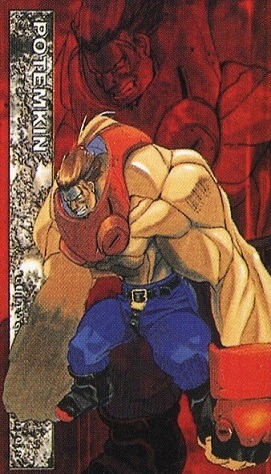
This design relates to Potemkin's story in the beginning. The Zepp empire in the past was a very corrupted, technology advanced nation. It contained battle-slaves with strength enhancement steriods and bound them with a special limiter. Potemkin was one of these battle-slaves with his huge, red metal color being the limiter. If he ever took it off, it would explode. However, Zepp was changed when Gabriel became President and freed all the Zeppian slaves, including Potemkin. He now serves as Gabriel's bodyguard out of genuine loyalty, gratitude, and care for his mentor and the renewed Zepp.
Judging on his old design by itself, I think he looked average(based on what he's wearing). His features definitely fit the saying "don't judge a book by its cover" because Potemkin is actually a gentle giant who's very intelligent. But the way he looks(except when interacting with certain characters), it's like he wants to break someone's bones, lol.
In the concept artwork in Guilty Gear X Plus(Japanese exclusive game), it hinted of what Potemkin will eventually developed into look-wise and story-wise. Even the pose from this pic was used later in Xrd SIGN. I really wish the design of the boots was used instead those weird looking ones he's wearing now, XD.
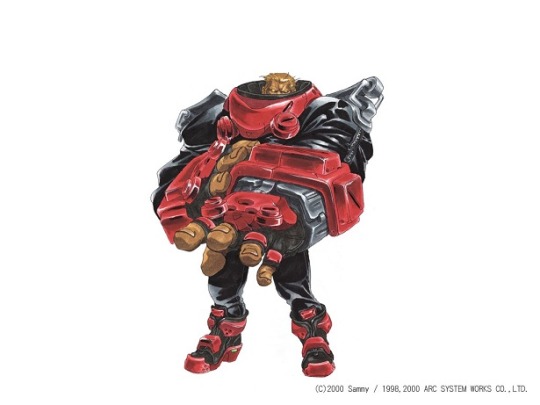
Now to look at Potemkin's design in Xrd SIGN.
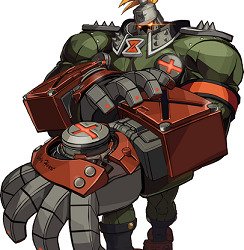
This is Potemkin's drastic redesign needed because of the changes in his life and his resolve being tested. I love this design so much because it accurately portrays Potemkin's personality. The first is his steel helmet with a spike at the top, accented with the Zepp symbol at the center of his forehead. His face is mostly shrouded in darkness except for the glowing lens. The yellow ponytail fur attached adds to the essence of a modern steel knight. Next is the black collar having spikes at the front; he also has on spiked shoulder plates to emphasis his strength. The power part is also in the round-shaped limiters attached to the upper parts of his uniform and glove compartment of his gauntlets. The design of his gauntlets is derived from the GGX Plus concept art, except the gloves completely cover his fingers and has a robotic aesthetic to it. I notice green is the most dominant color in Potemkin's design and there's a reason why besides it being Zepp's uniform.
Here is the Green Personality taken from Color Psychology (https://www.empower-yourself-with-color-psychology.com/personality-color-green.html):
You are a practical, down-to-earth person with a love of nature. You are stable and well balanced or are striving for balance - in seeking this balance, you can at times become unsettled and anxious. Having a personality color green means you are kind, generous and compassionate - good to have around during a crisis as you remain calm and take control of the situation until it is resolved.
You are caring and nurturing to others - however you must be careful not to neglect your own needs while giving to others. You are intelligent and love to learn - you are quick to understand new concepts. You are a good citizen and like to be involved in community groups. You have high moral standards and doing the right thing is important to you.
There is more, but I only taken pieces that describe Potemkin's personality, showing why green is his main color. Now onto his look in GG Strive starting with his helmet.

On the forehead of the helmet, the Zepp symbol is no longer a design mark, but an carved symbol with the words "Armor-clad faith" underneath. Instead of just darkness on his face, it accentuates the robotic aesthetic with the gears and the lens having an orange tint. Next is a full body screenshot of Potemkin.
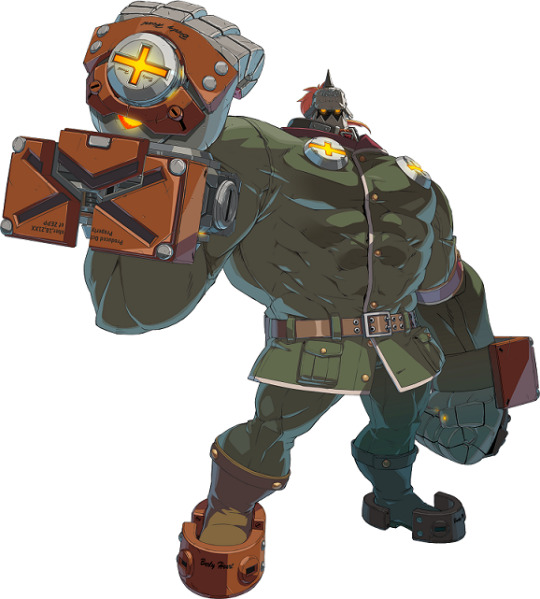
The spiked shoulder plates is less noticeable and his uniform is more formal. There's now a maroon-red collar with white trim and yellow buttons. The spikes on the black collar part of his outfit is gone, there's thick pockets on the lower part of his suit and has a brown belt instead of black. His boots is also brown instead of black and the plates around his feet is orange instead of red. There's additional limiters on his upper back that is revealed when doing certain attacks, showing his power has grown more. His muscle mass has also gotten super HUGE to the point I wouldn't be surprised if he reached Sentinel(X-Men) size, XD.
Design Rating: S++(Fantastic!) SOL BADGUY ------------ ---------- Sol Badguy is the main protagonist, so there was never a worry or surprise of his GG Strive design. There's also the fact his design isn't really new; it's heavily derived from the artwork of Guilty Gear 2:Overture. But first is looking at Sol's most iconic design from the GG series.
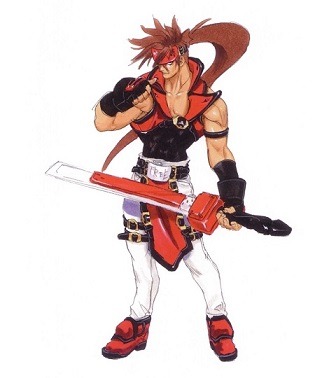
I'll always love this design because I think it's stylish, cool, and timeless. He's handsome in the traditional tough-guy way and perfectly fits the anti-hero type. His metal red headband acts as a limiter for his Gear powers and has the words "Rock You" in the center of his forehead. Besides it symbolizing his love for Queen's "Sheer Heart Attack" music album and controlling his Gear powers, it also symbolizes how he keeps his inner thoughts to himself and close-mindedness. He wears a black undershirt layered with a sleeveless, chest-length red jacket with a buckle strap. This style is very unconventional, which is exactly Sol is; he doesn't follow typical conventions. His red and black gloves conveys his toughness while his belt with the "FREE" tells of his philosophy. This also hints complexity to his nature since the belt is from when he was in the Holy Order, an aspect of his past. This shows he's inwardly caring and values the people in life along with his experiences. Lastly, is his white pants accented with buckles and red shoes.

The GG2:Overture Short Stories goes into some detail of the events before the game like how he was entrusted to raise Sin(Ky & Dizzy's son), etc. The major difference with Sol's design from the short stories is he's wearing a sensible red jacket similar to his old one, but its design still has traits of being its own style. His black undershirt is slightly different with a small V-shape cut-out in the middle, longer sleeves, and slightly loose around his stomach instead of fitted. His gloves has more of a biker vibe to them and no aspect of red nor buckles within them. He still wears red shoes on his feet, though tweaked in its looks. While this did hinted of Sol's character development, it wasn't a large factor because alot of the huge events at the time and before were placed on him rather than him confronting it by himself. It's why for Xrd SIGN, he primary reverted to his iconic look, though his GG2:Overture Short Stories look did get tweaked and used within the game's Story Mode. Now for his GG Strive look.
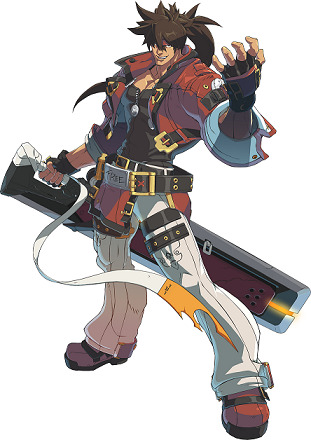
His GG Strive design blends both his GG2:Overture Short Stories look and aspects of his iconic design, which I really like. The red jacket with black trim conveys his free-spirited persona, yet also comfortable and relaxed. There's also a little bit more white seen on the cuffs of his jacket, meaning his heart is more open. This relates to his character development of finally confronting his past, his feelings, and his relationships. But he's still Sol Badguy and there's much for him to find out and explore, especially since red and black is still his main colors. There is deep meaning to this too.
Red Personality(https://www.empower-yourself-with-color-psychology.com/personality-color-red.html):
You are action oriented and physically active - sex is a necessity to you - you have strong survival instincts. Lovers of red are the explorers and pioneers of the world, the entrepreneurs and builders who like to be first in discovering new physical realms. You are always in a hurry, wanting to do everything right now. Patience is not one of your strong points. Red people can be aggressive and easy to anger, often exhibiting a violent temper - this is negative passion and energy. You flare up instantaneously but calm down quite quickly once you get it out of your system and then forget it ever happened. You have a strong need for power and control which is connected to your basic survival instincts.
Black Personality(https://www.empower-yourself-with-color-psychology.com/personality-color-black.html):
You are independent, strong-willed and determined and like to be in control of yourself and situations. You may appear intimidating to even your closest colleagues and friends, with an authoritarian, demanding and dictatorial attitude. You hold things inside and are not good at sharing yourself with others, possibly out of fear. You may be retreating behind black during a difficult time in your life such as a serious illness or a period of grief - black protects, allowing for a deep inner healing without interference from others. I'll add traits of the color White since there's a noticeable amount on Sol.(https://www.empower-yourself-with-color-psychology.com/color-white.html): Positive traits of White: Simplicity, self-efficient, growth/new beginnings, open, equality, rescuer, and sense of completion. These traits describe Sol. Overall, I like the design and feel it suits him well. Design Rating: S+++(Perfect!) MAY ----------- So far, May is the only female character revealed for the initial roster of GG Strive. There's mixed reactions with May's redesign for the new game. Some are happy she finally looks like she's in her early to mid teens(like 14 or 16) instead like a little girl. But others aren't happy with the changes to her outfit, saying it's bland. Let's look at May's iconic design.
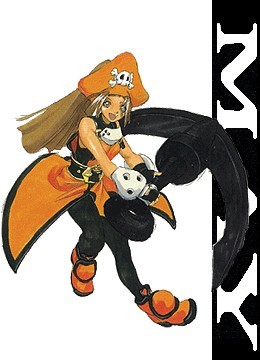
In my opinion, May is the coolest looking child character. Her open-sides style coat with side slits layered with a skin-tight bodysuit blends both cute and stylish. Adding to it is the tricon pirate hat, silver plating on her wrists and neckline, and orange short boots with black trim. Lastly, a black belt is around her waist while buckles accents her orange coat. This shows she's spunky, cheerful, and deceptively strong. In the story, her origins was unknown at the time, which perfectly fits due to there's black as part of color scheme(one of the meaning for black is mystery). Story-wise, May's development gradually grows from finding Johnny and later recruiting Dizzy as a member of the crew. Her curiosity of her heritage surfaces, causing some changes in her design.
In Xrd SIGN, Her skin-tight bodysuit is gone and replaced with just a black, fitted tank underneath her orange overalls. Her pants is loose-fitting along with having a big buckle around her waist and different boots still in orange with black trim. She doesn't have the silver plating collar, but other aspects of her iconic look like her pirate hat is kept. May finally finds out she's Japanese and dealing a mysterious condition that (currently) can't be cured. This is a huge story development for May that leads to be expanded further and another redesign. First is looking up the facial shot of May for Guilty Gear Strive.
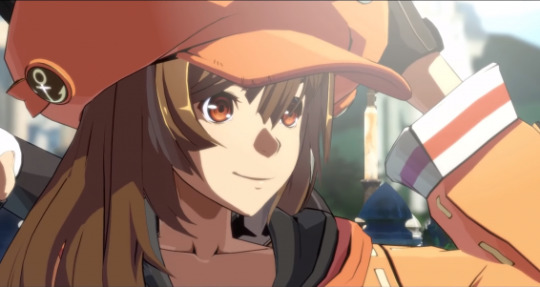
May's facial features is the first noticeable difference. The art-style is a strong factor in this, but May looks physically older. She still has big, cute brown eyes, though not as large as in Xrd SIGN. This makes her face appear a little longer face to convey a hint of maturity. Yet, she still hasn't escaped being just cute in an innocent way. Another difference is her hair is slightly shorten to halfway to her back instead to her waist. It's also loose instead of a thick ponytail within her pirate hat, which I think it's a nice little change. Her hat is shaped more round instead of oversized tricon while still retaining the pirate skull at the front. The anchor design on the sides makes it both simple, yet stylish. Now to see the full body of May's new look!

.....Lol, May is wearing a dumb orange hoodie, XD. What's worse is the hoodie has no special designs pertaining to May's personality or style; it's overly casual. There's also no shape, making her look like a fat fish. The skin-tight black short-shorts doesn't help with how oversized the hoodie is, which if it weren't for certain angles, it gives the illusion she isn't wearing anything on her lower body. It looks like lounge wear meant to be worn around the house instead of clothing a person would wear going on an adventure. Speaking of adventure, she has a backpack.
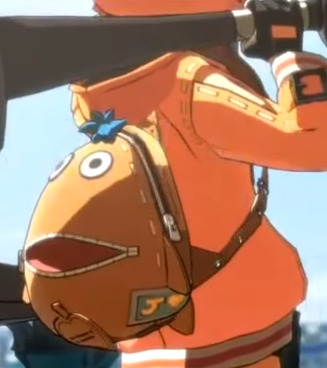
The backpack itself is cute because it's Chimaki(mascot of GG) and do see the the letter J with a heart; meaning love for Johnny. But other than this, this backpack also doesn't really relate to May. Besides being the mascot for the series, Chimaki is specific to Sin because it's favorite toy. None of May's official art ever showed her having a Chimaki toy or accessory. The casual look gives me the impression she quit the Jellyfish Pirates, but her winning animation of her saying "Jellyfish victory!" and Leap(the elderly lady who cooks) being there disproves this theory. Besides the hat, the only things kept from her iconic look is her gloves and boots. There's a heart on one of her thighs; a fitting aspect for a pirate.
Now to look at the Orange personality since it's May's main color(https://www.empower-yourself-with-color-psychology.com/personality-color-orange.html):
With orange as your favorite color, you are warm, optimistic, extroverted and often flamboyant. You are friendly, good-natured and a generally agreeable person. You are assertive and determined rather than aggressive - having a personality color orange means you are more light-hearted and less intense than those who love red. You thrive on human social contact and social gatherings, bringing all types together.
You live your life based on your 'gut reactions'. You are an adventurer - you love the outdoor life, camping, climbing mountains and indulging in adventurous sports such as sky diving and hang gliding. You are the daredevil, always looking towards your next challenge, your next great adventure.
This definitely fits May's nature. My impression of her simpler look probably hints of May is unsure of herself and trying to figure something out. Her expression in her new character portrait has this too; it's the first one of her not smiling. But I still think this new look for May is bad(except for the hat, the boots, and the gloves). Her design should've been something like this picture link below.
https://imgur.com/Ue1XdhT The top would need to cover her stomach, but this design perfectly fits with May's nature and role as a Jellyfish Pirate. It also conveys she's adventurous and can easily implemented the backpack as part of the design. But it wasn't used... I'm nicknaming her May of the Jelly-Fat, lol. Worst design so far(and hopefully the only one). Design Rating:D(for Derailed) KY KISKE ----------------- Ky's radical redesign for GG Strive was such a huge shock to everyone. At first, people thought it was Sin(Ky's son) until examining him closely. It's funny how many people are saying "Ky's handsome now" and saying he has an athletic body when in reality, he always did, XD. It isn't the first time Ky got big changes to his look based on the events in his life, but I'm going to focus on Ky's iconic design.

Ky is the opposite of Sol; the traditional knight-in-shining-armor type hero. This is another design I'll call timeless and my personal favorite look for Ky. He's very handsome in a princely way, which is fitting since Ky is a French noble. He wears a white shoulder cape containing a high collar with blue trim. It's attached to the blue knight-tunic with black trim in the front, accented with a white, trench-coat like detail. There's twin belts attached to his blue and black gloves while one is on his matching boots. Layered underneath his uniform is his black and white, sleeveless turtle neck and fitted detached sleeves. The belt around his waist with "HOPE" conveys Ky's philosophy. This attire is the Holy Order uniform, which conveys how strongly Ky holds onto the teachings and experiences he had during those times. His story at the time was about fulfilling his duty and doing what he knows and believes is right. Blue and white has always been Ky's main colors, which tells alot about his personality.
Meaning of White Personality(https://www.empower-yourself-with-color-psychology.com/personality-color-white.html):
Having a personality color white means you are neat and immaculate in your appearance, in the presentation of your home and in your car, almost to the point of being fanatical. You are far-sighted, with a positive and optimistic nature. You are well-balanced, sensible, discreet and wise. You think carefully before acting - you are definitely not prone to impulsive behavior. You tend to have a great deal of self control. You may appear to be shy, but you do have strong beliefs about most things and love the opportunity to air those beliefs. The challenge for you is to be open-minded and flexible and to communicate your needs and desires. Meaning of Blue Personality(https://www.empower-yourself-with-color-psychology.com/personality-color-blue.html): You are conservative, reliable and trustworthy - you are quite trusting of others although you are very wary in the beginning until you are sure of the other person. At the same time, you also have a deep need to be trusted. You are not impulsive or spontaneous - you always think before you speak and act and do everything at your own pace in your own time. You take time to process and share your feelings. You are genuine and sincere, and you take your responsibilities seriously. Having a personality color blue means you have a deep need for peace and harmony in your everyday life - you don't like having your feathers ruffled. You would benefit from daily meditation and quiet time for reflection, introspection and self-discovery.
You appear to be confident and self-controlled, but may be hiding your vulnerable side. Being a personality color blue means you are generally fairly even-tempered, unless your emotions take over - then you can become either moody and over-emotional, or cool and indifferent. You are sensitive to the needs of others and caring with your close circle of friends. While you are friendly and sociable, you prefer the company of your own close group of friends.
You are a rescuer and love to be needed but one of your lessons is to learn to love yourself first - you live from your heart and are always busy putting the needs of others first. You can be rigid - you like to stick to what is familiar to you and it is hard to sway you from your path - you stubbornly do things your way even if there is a better way. You need to have direction & order in your living and work spaces - untidiness and unpredictability overwhelm you.
You are approachable and friendly, always making people feel welcome in your life. You have a thirst for knowledge in order to gain wisdom and appear knowledgeable in whatever area interests you. You are spiritual or religious with a high degree of devotion to family, God, or other causes that are important to you. If reacting negatively, you are prone to self-pity. These perfectly fit Ky's personality and has mostly stayed with him throughout his character development. Now to look at his GG Strive redesign beginning with the head.

One of the obvious difference is Ky's hair is short, reminiscent of his iconic look. But it raises the question of how since according to the story, it's stated his hair grows rapidly no matter how many times he tries to cut it(due to heavily implying he's part Gear). I'm guessing either Ky followed Sin's method of cutting his hair every 3 days or he found a special hair product to prevent rapid growth, XD. I notice the style of his hair is a bit different; the strands of his bangs is shorter and thicker. It creates a boyish look instead of a young man, which doesn't fit Ky. It doesn't seem noticeable during gameplay, but cutscene-like sequences it's the opposite. His hair should've been exactly like GGX2.
His facial structure and eyes in GG Strive is exactly like in GGX2 except for one part; his chin. While Ky's chin was never wide like most male characters, it usually isn't this narrow either. The narrower chin makes him look younger and with how the hair is styled, it gives the impression it's Ky from an earlier timeline. If his chin was similar to how it was in GG X2, it will improve his look alot and show he's mature and sophisticated. Next is examining the full body picture of his new look.
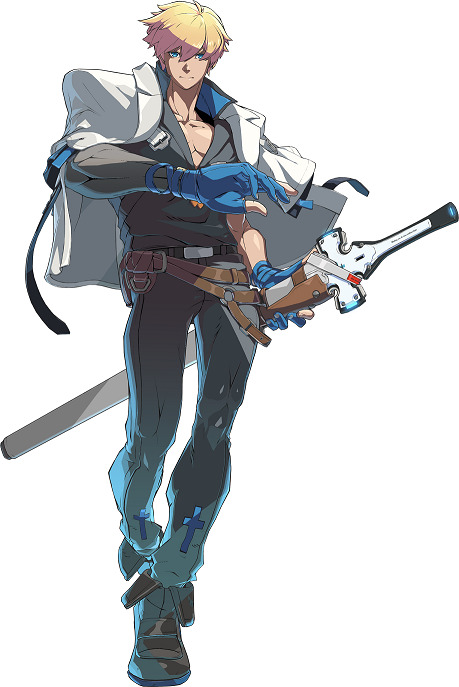
This is a huge departure in many ways. The only aspect inspired from his iconic design is the shoulder cape, but it lacks the blue trim around the helms and collar. Instead, there's black trim at the helms and hints of blue at the back with the words "Illyrium". His semi-fingerless gloves with fingernail plating is something he doesn't usually wear, but the back of his hands does have plating saying "Nothing can be done without hope". It shows he still generally has the same philosophy and key traits he's known for. The fact his "HOPE" belt is replaced with 2 standard belts(one black and the other brown) implies his mindset he carried from the Holy Order is gone and became open-minded. His open, V-neckline shirt with a single sleeve is inspired from this.
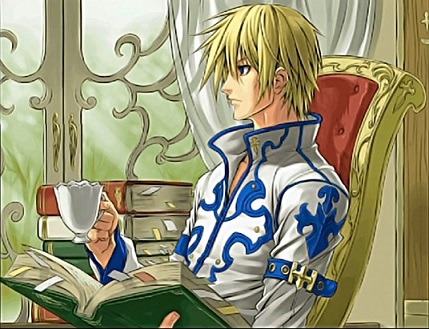
I do find it interesting how this reveals(pun intended) a different side of him, XD. It adds a sense of sensuality that leading men from romantic novels have and obviously it being sexy. Next is his fitted pants accented with blue crosses at the front then his boots with blue trim at the bottom. The most significant change is how Ky's dominant color is now black, which has important meaning to his character development.
Positive traits of Black: Include protection and comfort, strong, contained, formal, sophisticated, seductive, mysterious, endings & beginnings.
Negative traits of Black: Depressing and pessimistic, secretive and withholding, conservative and serious, power & control, sadness and negativity.
All of these fit Ky and since he's wearing alot of black instead of blue and white, this implies he has or going to have an internal struggle. I haved mixed feelings about his new design.
I love the concept of it and think it's nice to see Ky wear something different as his main attire. By itself the outfit is good and easy to adjust to, it's just not as unique as his original design. The design of blue crosses from his GG Accent Core Plus ending should've been implemented in the new design and add some gold trim to balance out all the black. I think his gloves should be changed to be more stylish along with the silver plating. If it had these tweaks, Ky's new design would be perfect.
Design Rating: A(Great!) CHIPP ZANUFF ------------------------ The reveal of Chipp's redesign has mostly been positive, but all of us immediately said "He is so BUFF!" People say he looks handsome now and have joked he worked out at the same gym as Chris Redfield, XD. Let's look at Chipp's previous design!
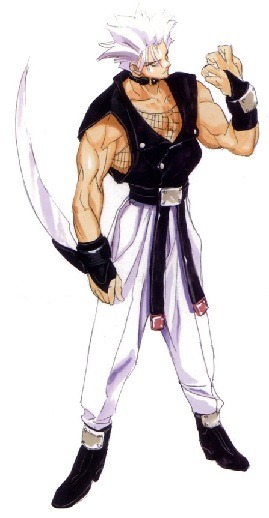
Chipp's iconic look definitely displays the street-punk style and rowdy persona. This perfectly fits with his dark past of being a former biochemical drug dealer and addict. He has wild spiky hair, small red earrings, and a leather choker around his neck. The fishnet undershirt is both punk-style and those who practice ninjitsu wears. He has fingerless gloves with silver, square-shaped plating. This aspect is also on his belt and short-length boots. There's two leather buckles strapped around the right leg of his white pants and has on a loose-fitting ninja vest with silver buttons. This highlights his newly adopted values he got from his mentor and father-like figure Master Tsuyoshi. Chipp even has on black eyeliner around his eyes to emphasizes the punk look. Since he primarily wears black and white with hints of red, this tells about his personality. Black and white together obviously means viewing things in a straightforward way instead of complex like gray. Red conveys of his hot-headed masculinity, passion, and impatient nature. Combined with the other colors, it shows Chipp's other side of having pure intentions, even though it doesn't always come across right.
In Xrd SIGN, only minor tweaks were made such as adding a red sash attached to his belt, extra detail on his pants and boots, and slightly thicker eyeliner. Ever since becoming president of a (currently) unofficial nation dubbed "Eastern Chipp Kingdom", Chipp's personality seemed to have mellowed some, though still has his impulsive tendencies. Chipp has been through alot of character development since the beginning. Now for his redesign for GG Strive starting with his face.
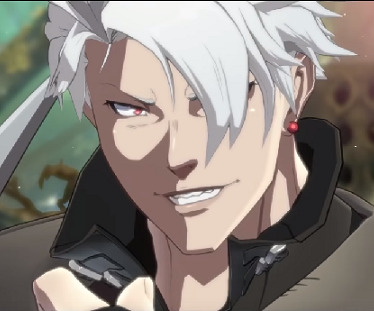
One of the things I notice about Chipp's face is while it's still narrow, it's a little fuller and smoother with slightly higher cheek bones. His chin is also about an inch or 2 wider than how it was in the Xrd series. His eyes still has the same defined shape, but the eyeliner isn't as thick. These tweaks to his facial features makes him look handsome and approachable instead of angry and rough. But his fiesty side is still there because besides his eye shape, his upper teeth now has some small fangs. Now to see a full body picture...
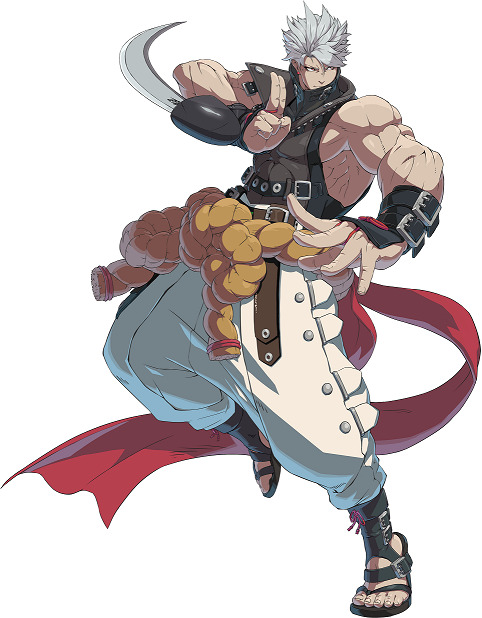
Chipp's hair also got tweaked; tt's still spiky, but more stylish instead of wild. Instead of strands of hair rest on his forehead, he has noticeable asymmetrical bangs. Besides his red earrings, Chipp's 2 main colors(black and white) is kept along with a little more red from the strings attached to his ninja gauntlets and strapped sandals. He still has the red sash attached to his belt, though this time he has a thick, rope belt(I think it's called "Obi"). His white pants is very loose-fitting and no longer has twin buckle straps, but does have a little more detail with the side silver buttons. On his upper body, Chipp has on a leather vest with a form-fitting, sleeveless turtleneck. The height of the collar covers his mouth and contains buckle straps. This look is inspired from his design in "The Butterfly and Her Gale".
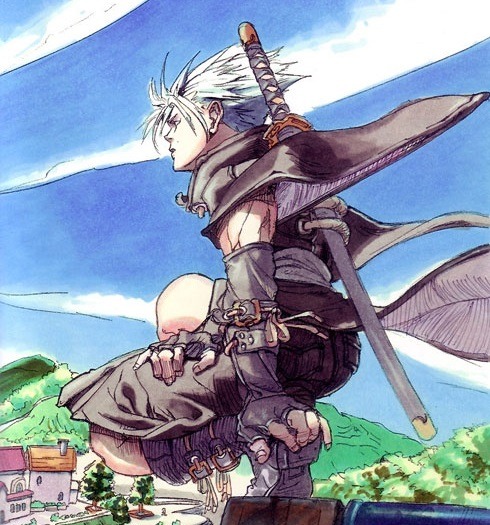
It has aspects of the high collar, gauntlets, and boots, even though the boots was tweaked to be sandals. This redesign shows Chipp fully embraces Japanese culture and the ways of ninjitsu. I think it may also hint of him being or becoming a master himself and training others, especially with how he's gotten so muscular. The way they mixed old and new with Chipp's redesign is amazing and love the tweaks to his face and hair. I do think his pants maybe a bit too wide along with the rope-belt, but other than that his look is perfect.
Design Rating: S++(Awesome!) AXL LOW ------------------- "Axl got PANTS!" is the main reaction people had when he got revealed and the majority agree it's a much needed upgrade. This is the 3rd time Axl has gotten major design changes since GG:The Missing Link. His look from GGX and onwards greatly emphasizes he's heavily inspired from real-life singer Axl Rose. For Axl, I'm going look at his redesign for Xrd SIGN.
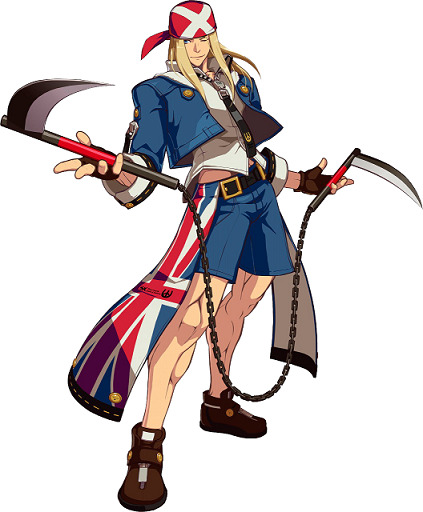
In comparison to the others, Axl's design was never high-fantasy or elaborate, but it makes sense he's from the 20th century. His look in Xrd mixes aspects from the 1st GG and GGX, which conveys his easy-going nature and trying to adapt to the future he's in while maintaining his values of the past. He still has his signature UK cap, brown fingerless gloves, and matching shoes. His white shirt has a unique black zipper tie that adds a hint of contemporary along with his blue jacket. Attached to his black belt on the hips is cloths of the UK flag and has on blue shorts. Red and blue has mostly been his main colors(with some white) that tells of his peaceful, friendly, and passionate nature. In the story, Axl is finally confronted about why he time-skips and must make a hard decision that forever change his life. The choice he made leads him to major character development along with what role he will play in the story, so he needed another redesign to reflect this.
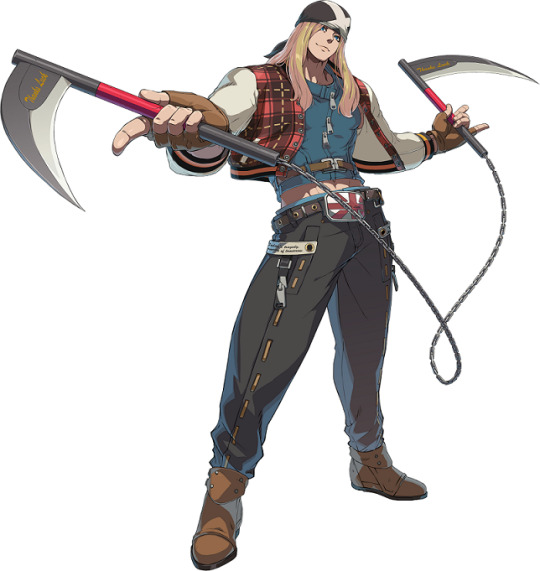
This design shows Axl has embraced the current timeline while maintaining his love for his country. His fingerless gloves is a lighter brown along with his ankle-length boots. He wears a red plaid jacket with white sleeves and black with orange trim at the helms. Underneath is his a sleeveless, form-fitting tank with 3 zippers at the front and a brown buckle at the mid-section. On his lower body is a belt with a UK buckle and fitted, detailed black pants with zippers on the side. This look is inspired by the concept art.
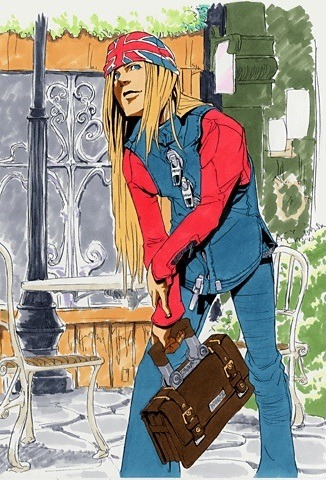
I notice his new design as a mixture of colors compared to before, though it seems black is the most dominant color. One of the meanings for black is power and control, which fits with how Axl now has control over his Time powers. He also has an aura of confidence compared to his uncertainty in the past games. This is the perfect design for Axl because he looks amazing and conveys his personality well.
Design Rating: S+++(Perfect!)
Thank you for reading this! I'll make a series of this as more characters of the game are revealed in the future!^_^
#GG2020#Guilty Gear 2020#GGS#Guilty Gear Strive#GG Strive#arc system works#daisuke ishiwatari#Sol Badguy#Ky Kiske#May#Chipp Zanuff#Potemkin#Axl Low#character redesign#my thoughts#analysis
13 notes
·
View notes
Text
I finished Persona 5 Royal, after 135 hours. My feelings on the new content are mostly very positive, though do I have a few issues with it. Here's a suuuuuper long write-up first about Persona 5 and then about Royal. This is gonna have full spoilers for both versions of the game, so keep that in mind if spoilers for either game bother you. Persona 5 is my favorite game of all time for several reasons. The first is how masterfully it's written. Not necessarily line-to-line (and certainly not in the English localization, which could've used a few more weeks of edits to make the sentences sound more natural), but in its structure, thematic unity, and use of allusions to achieve that unity. The first two-thirds of the game are presented through a complex and well-orchestrated frame device that's honestly just a treat to experience. It presents the player with a glance at each upcoming story beat without the context to understand it, then lets them piece together the context as they go, giving the whole game a sense of mystery even as the player inhabits the characters at the center of the mystery. It also uses concepts from Jungian psychology to tell its story, most notably character archetypes, which means players can use knowledge of the archetypes to better understand aspects of the characters and their stories. It's beautiful, and it means that I often fall down rabbit-holes researching the allusions made and finding the connections they have to the story. The other reason Persona 5 is my favorite game is much more personal, but it actually played a major role in my radicalization (or if you're uncomfortable with such terminology, political reawakening). The game released in early April of 2017, only a few months after Trump took office, and partway through my first semester back at school after my five year...break. The game is about fighting back against societal injustice. It starts out small, with a high school teacher who abuses his students, but moves up to people with increasingly greater power exploiting increasingly larger swaths of the population: a famous artist using his clout to steal his students' livelihoods, a mafia boss stealing money from the people of his neighborhood, a CEO overworking and underpaying his employees while jockeying for a political position, a government prosecutor who fabricates evidence to maintain her perfect record, and finally a member of the Diet running for Prime Minister who uses populist rhetoric but only cares about gaining personal power. As in previous games, each protagonist gains their powers by awakening to their Persona (essentially publicly performing as their true, unfiltered selves), but in this game, the process is physically painful, bordering on body horror. The act of tearing off the masks so tightly glued to the characters' faces is cast in a similar light to putting on the glasses in "They Live:" doing so is painful and frightening, but allows each character to see the world for what it is, without the filter of the justifying ideological framework. In the last dungeon of the game, the characters invade the physical manifestation of the justifying framework, which takes the form of a prison in which the prisoners beg to be left inside, as the idea of freedom from the prison terrifies them. A vein running from each of their cells sucks out their life force, vampirically, and directs that life force into the manifestation of the concept of hierarchical structures itself, portrayed as the holy grail - a reference to Marx's Capital. This holy grail - which to Marx was wealth - is revealed to be a false god created by the masses because they wanted a god. However, it grew so powerful that now the masses serve it, rather than the other way around. It created its own artificial collective unconscious, barring its subjects from participating in a true collective unconscious free of its influence. At the very beginning of the game, a voice directly tells the player they may only play Persona after agreeing that the events of the game are entirely fictional, and any similarities to the real world are entirely coincidental. The game will not start until the player indicates that they agree to those terms. That voice is revealed to be the holy grail itself, implying that to refuse to compare fictional works to the real world or "get political" about these stories is to submit yourself to the justifying ideology. That's some powerful stuff, and grounding it in real-life examples of exploitation while following characters suffering from that exploitation made it hard to ignore, especially in the wake of the 2015-2016 rise of Fascism and at a time when I was back to studying literary analysis. The game seems specifically crafted to induce a radicalization in its players. It has a scene in which the characters attain class consciousness. For a chunk of the story, the characters try to fight against manufactured consent, as they are framed by the media and authority figures as dangerous villains just for taking a nonviolent stand against rapists, billionaires killing their employees, and corrupt officials. The citizenry believes it almost unquestioningly. The protagonists are often visibly enraged at the exploitation they see - much of which is based on specific real-world events - and the internal logic of the story suggests that this rage is the only moral response. Every aspect of the game bolsters these themes of hierarchy, exploitation, and rebellion, giving the game a thematic unity unlike any I've ever seen before. Even the smallest NPCs have full storylines running in the background that highlight the ways even these nameless characters are exploited, and the ways they've been socialized to accept this exploitation. Every book, every song lyric, every reference to a food item, every damn fictional allusion in a game ABOUT FICTIONAL ALLUSIONS ties back in some way to that larger theming. The thematic unity of this game sings, and playing it was unlike anything I'd experienced before. This game, for me, defined Leftism. I didn't put down the controller a full-blown Communist, but it gave me the tools I needed to ask the necessary questions to discard Liberalism. I probably would have gotten there eventually, and the game probably wouldn't have had quite as powerful an effect if I weren't a literary/media analysis kind of guy living in the time I was in, but even now, three years later, the game reads to me like a damn revolutionary text. So I was honestly terrified of Persona 5: The Royal, which came out at the beginning of this month. It's a rerelease of the game with added story content, including a new dungeon, a new party member, the return of a deceased party member, and a new ending. That's a lot to add onto a really fun game with unprecedented thematic unity that also helped me to redefine myself and my positions on...literally everything. If they messed with this unity for the sake of adding unnecessary content, it would heavily alter the game's effect, and my own personal understanding of the game, forever. That's not to say that the game couldn't be improved. The localization was kinda shoddy, it occasionally drifts into male gaze shit (glaringly so in the 2D animated cutscenes, which makes me wonder if the animation studio had different ideas about the project than the devs did), there are two scenes which are virulently homophobic, and the devs had originally planned for another party member who they had to scrap for time. The two homophobic scenes especially have made it difficult to recommend the game, as I've always had to add the caveat of "...but it completely undermines its own central thesis twice for cheap laughs and it's disgusting." I wasn't sure, however, that a rerelease would fix any of these issues, and I was really worried that adding ~25 hours of gameplay after the dungeon about the justifying ideology and the holy grail would undermine too much of what made the game so revolutionary to me. There is no larger threat to humanity than the ideological framework justifying capitalism, so I worried that moving away from that for the length of a whole-ass Kingdom Hearts game would make the game less effective. From a storytelling perspective, the party member they advertised they would bring back to life is an unambiguous villain, and I worried that bringing him back would both undermine the sacrifice from his death scene and rehabilitate the character, neither of which I wanted. The new party member was not the character they had planned for and cut, and her story as it was advertised did not involve her being exploited by people in power in any way. Rather, she's a star athlete and honors student whose success was attributed to her sense of personal responsibility, which runs pretty counter to the game's themes. I also worried that adding a new dungeon worth of gameplay would mean getting rid of the part at the end of the game where the protagonist willingly turns himself in and spends several months imprisoned, so that he can testify against one of the villains of the game. The thought of losing that bittersweet ending definitely didn't sit right with me. As I said at the beginning, my feelings on the new content are mostly positive. Before getting into pure spoiler territory, I'll say there's no going back to the original now that this version exists. They redesigned every dungeon and boss fight, retooled the battle system, added a LOT more voice acting to scenes where there hadn't been any, added a ton of new scenes further fleshing out characters and the setting, retranslated the worse lines from the localization (it's still not perfect but it's much improved), added new gameplay mechanics and personas, added a bunch of great new music, expanded on Tokyo, and FIXED THE FUCK OUT OF THE HOMOPHOBIC SCENES. I now actually really like the two nameless characters who were in the original just straight up predators, as they've been rewritten into overenthusiastic drag queens who get excited at the thought of introducing nervous kids interested in drag to the scene. They improved on dungeon crawling, too: the newly added grapple hook mechanic introduces a fun verticality to the dungeon designs, stealth is more challenging and rewarding, and each dungeon has new optional collectibles. They reimagined the procedurally generated dungeon you explore over the course of the game, too, giving it more room types, more music, a currency unique to the dungeon, a merchant, and ways to level up money, experience, and item rewards from the enemies in the dungeon. As for the new story content, the extra 25 hours of gameplay is not...counter to the themes of the game. Instead, it's set up as a story about Revolution vs. Reform. The question it poses to the people of its now-too-content Tokyo is "would you join the Phantom Thieves?" which translates more to something on the order of "if these exploitative systems still existed, but didn't really hurt you or anyone you know, would you still care enough to fight against them?" The new villain co-opts the place formerly held by the Holy Grail and uses it to rewrite reality to one in which everything is basically the same, but almost everyone in the city has everything they want (with the notable and noticeable exceptions of homeless people and service workers). The central conflict, especially to the characters who have regained lost loved ones, is whether they should still fight for a better world if most people are fairly happy. Tokyo never ends up agreeing that they would join the Phantom Thieves, but the crew still end up determining that they must restore the real world, because a world in which people are still critical of the justifying ideology has a path to a better world, while one in which people are uncritical will never find that path. It's a complex and interesting take from the beginning, and even moreso when the game uses imagery from the mythologies of the garden of Eden and Prometheus. The other dungeons correspond to deadly sins, but this one instead corresponds to "sorrow." The villain is so afraid of his own grief and the grief of others that he refuses to allow anyone to take risks, even if success would improve the world. The three new confidant arcs are well thought-out and engaging, too, especially the arc with the villainous party member, whose actor absolutely chews the scenery in this game. In the new story, he's so angry about being forced into a reality on someone else's terms that he fights tooth and nail to return to the old reality, where he was at least able to die on his own terms. It's...not as emotional as the game wants it to be, but it's a really fun time. Each party member also gets a mini arc in which they come to terms with what they would lose by returning to the old reality, and acknowledges how much personal growth they would lose by staying. These culminate a new ending in which each party member finds a way to work to regain some of what they had lost by restoring reality, going their separate ways in the process. The new content has a bit of a Persona 4 vibe, in that it's much more personal and contemplative, and the characters find strength by maturing and uncovering avenues to personal growth. As Atlus has pretty consistently existed both in the shadow of Persona 4's popularity and with the pressing need to make up for Persona 4's failings, it's not a bad angle. I do have some minor issues with the new story. It still means that there is no downtime after the original final boss, so newcomers won't really have much opportunity to consider the implications of that dungeon and boss before being thrust into another conflict. Its ending is not quite as clear-cut as the original ending, either. The protagonist still turns himself in, but the story basically...switches back to that reality a week before his release, meaning it's not nearly as much of a sacrifice and it's a decision this version of the protagonist technically didn't make for himself. The situation is probably also clearer to people who've played the original game than to newcomers. The old ending is kind of "required reading" for fans; it's still the canon ending for Scramble where the new one is not, and the new one is more impactful to players who've already experienced the original ending. This creates a major predicament when recommending this game to new players. Do I tell them to purposely not fulfil the requirements to get the new ending, then replay a 130+ hour game a second time? Should they keep a save at around the 85 hour mark, so they can reload their save and retread the 20 or so hours of game they've already experienced to get to the new stuff? There's no good answer, which is irritating. At least the original ending is included in this version, so those are options, but it's frustrating that I can't just recommend one or the other without caveats that are also huge time sinks. I dunno how to end this, and it's much longer than it probably should be, so I'll say that this game is extremely important to me, and I'm impressed that Royal is not less important to me. I sure hope we get a release date for the worldwide release of Scramble soon.
5 notes
·
View notes
Photo

Dark Academia novels are some of my personal favorite novels, they are novels that centre on an academic setting. The term Dark Academia, is an unofficial name for the genre, as they, at least in literature, are called campus novels or academic novels.
Dark Academia novels contain elements of both satire and tragedy, and they tend to focus on the humanities and liberal arts, these tend to play a role as the passions of the main characters, which ends up driving them too far. The genre has a tendency to over-romanticize a liberal arts education, and it also generally disregards pock, women, lgbt+ and more. It has in many ways been centered a lot on straight white men, with women playing the role of an innocent, and the token gay man, playing the role of comic relief, and a way for the main character to experiment.
Some of the common tropes found in Dark Academia are:
Murder and death
Strong friendship
An adult authority figure is usually the opponent
Social class differences
These are usually the way in which the author brings forth the actual dark part of Dark Academia.
These strong friendships are usually used as a motivator for the murder in some way, whether it be a positive or a negative friendship.
This opponent also shows the opponent that is the societal norms, as this is also often a huge part of what the main character is fighting against.
The main character often comes from a working class family, while the majority of the peers come from wealthy families. This creates an inert need for the main character to please their peers, as they fear not fitting in.
As Dark Academia takes place in a campus setting, the stories are usually coming of age novels, that tell the story of how one event changed the life of the main character.
When most people think of Dark Academia they think of “The Secret History”, it basically fosters the genre and it is the home for many of the tropes talked about previously, it introduces the event right at the start, the murder of Bunny. This distinguishes the genre from other mystery and thriller novels, as those are usually who-dun-it, the secret history introduced the why-dun-it instead. This creates a thriller based more in the minds of the characters, and not so much in the actual crime committed.
“The Secret History” draws in many ways on the classical world, the main characters in the novel are all students at a liberal arts college, who study classics. This theme of classics also moves into the composition of the novel, as it is in some ways draws on Aristotle’s poetics.
In many ways one can say that the genre of Dark Academia is based in tragedy. In tragedies and in the “tragic vision” there are seven elements, those being:
The conclusion is catastrophic. The ending is perceived as the concluding phase of a downward movement. And the ending is unhappy as it results in the hero’s or heroine’s fall from fortune and consequent isolation from society.
The catastrophic conclusion will seem inevitable. To the audience of a tragedy, the catastrophe will seem inevitable. Whether grounded in fate or nemesis, accident or chance, the operating forces assume the function of a distant power.
It occurs, ultimately, because of the human limitations of the protagonist. Ultimately, the instances that we find in tragedy happen because of powerlessness, of undeniable human limitations.
The protagonist suffers terribly. It is because of the human limitations that suffering becomes basic to the tragic vision and the tragedies testify to suffering as an enduring.
The protagonist’s suffering often seems disproportionate to his or her culpability. It is because of the human limitations that suffering also becomes basic to the tragic vision.
Yet the suffering is usually redemptive, bringing out the noblest of human capacities for learning. Despite the inevitable catastrophe, the human limitation, the disproportionate suffering, the tragic vision implies that suffering can call forth human potentialities, can clarify human capacities, and that often there is a learning process that the experience of suffering induces.
The suffering is also redemptive in bringing out the capacity for accepting moral responsibility. Tragic protagonists more frequently have an active role, one which exposes not only their errors of judgment, their flaws, their own conscious or unwitting contribution to the tragic situation, but which also suggests their potentialities to endure or survive suffering, and to attain a complex view of moral responsibility.
These seven elements can roughly be used to describe novels in this genre, as many of them use tropes and archetypes from tragedies. One must always be wary and critical of these theories and models used to sum up entire genres of fiction, as it is never possible to sum up something so diverse and different with just seven elements, but it is a fun thing to analyse the Dark Academia novel with, and to see just how closely they resemble the classic tragedies.
Books in the Dark Academia genre, i have not read all these books but they are books which have been categorized as Dark Academia multiple times:
If We Were Villains by M.L. Rio
On the day Oliver Marks is released from jail, the man who put him there is waiting at the door. Detective Colborne wants to know the truth, and after ten years, Oliver is finally ready to tell it.
Ten years ago: Oliver is one of seven young Shakespearean actors at Dellecher Classical Conservatory, a place of keen ambition and fierce competition. In this secluded world of firelight and leather-bound books, Oliver and his friends play the same roles onstage and off: hero, villain, tyrant, temptress, ingénue, extra. But in their fourth and final year, the balance of power begins to shift, good-natured rivalries turn ugly, and on opening night real violence invades the students’ world of make believe. In the morning, the fourth-years find themselves facing their very own tragedy, and their greatest acting challenge yet: convincing the police, each other, and themselves that they are innocent.
‘What is more important, that Caesar is assassinated or that he is assassinated by his intimate friends? … That,’ Frederick said, ‘is where the tragedy is.’
The Rules of Attraction by Bret Easton Ellis
Set at a small affluent liberal-arts college in New England eighties, The Rules of Attraction is a startlingly funny, kaleidoscopic novel about three students with no plans for the future—or even the present—who become entangled in a curious romantic triangle. Bret Easton Ellis trains his incisive gaze on the kids at self-consciously bohemian Camden College and treats their sexual posturing's and agonies with a mixture of acrid hilarity and compassion while exposing the moral vacuum at the center of their lives.
No one will ever know anyone. We just have to deal with each other. You’re not ever gonna know me.
The Basic Eight by Daniel Handler
Flannery Culp wants you to know the whole story of her spectacularly awful senior year. Tyrants, perverts, tragic crushes, gossip, cruel jokes, and the hallucinatory effects of absinthe — Flannery and the seven other friends in the Basic Eight have suffered through it all. But now, on tabloid television, they’re calling Flannery a murderer, which is a total lie. It’s true that high school can be so stressful sometimes. And it’s true that sometimes a girl just has to kill someone. But Flannery wants you to know that she’s not a murderer at all — she’s a murderess.
She had the look in her eye when you kick and kick at the door and it doesn’t open, when you write a boy letters and letters and he never loves you, not ‘til the day he dies. Not even then.
The Lake of Dead Languages by Carol Goodman
Twenty years ago, Jane Hudson fled the Heart Lake School for Girls in the Adirondacks after a terrible tragedy. The week before her graduation, in that sheltered wonderland, three lives were taken, all victims of suicide. Only Jane was left to carry the burden of a mystery that has stayed hidden in the depths of Heart Lake for more than two decades. Now Jane has returned to the school as a Latin teacher, recently separated and hoping to make a fresh start with her young daughter. But ominous messages from the past dredge up forgotten memories. And young, troubled girls are beginning to die again–as piece by piece the shattering truth slowly floats to the surface. . . .
Yes, he had been preoccupied, but hadn’t that been what I was looking for–someone who wouldn’t pay too much attention, someone who wouldn’t look at me to closely?
Daily inspiration. Discover more photos at http://justforbooks.tumblr.com
9 notes
·
View notes
Text
Romancelandia you don’t have to ask I’m just gonna say it anyway~
Original Post Here
Barbara Cartland: Favourite author?
Courtney Milan.
Alisha Rai: Favorite era? (i.e. when they were written, not when set)
Current! I’m ecstatic to see how much more punk the romance novel genre has become lately- so many authors explicitly talking about race and class and gender and mental health and neurodivergence in so many interesting ways. Independent publishing opening up entirely new avenues which were not recommended for traditional publications. It’s exciting and wonderful.
Eve Dangerfield: Favourite setting for historicals?
Not sure if my opinion matters here because I have read books from very few eras? I think my preferences have moved to mid-to-late Victorian era for England-based books, but what I really want more of is historicals on other (non North American) continents. I badly want to do a romance in Historical India that is not about Englishmen, for example. Like a Muslim and Hindu falling in love during the Aurangazeb era, maybe.
Anne Mather: Favourite contemporary setting/sub-genre
Again, I haven’t really read enough to form a nuanced opinion- when I look for contemporaries, my first priority used to be “does this make me laugh?” Which is um- a relic of a bygone era, because that used to be the only thing I wanted from contemporaries.
Right now, I try to get read more of diverse romance in contemporary eras. Again, including non-American/English nationalities.
Georgette Heyer: Third or first person tense?
Either will do. It’s not really a factor in how much I enjoy a story.
Lisa Kleypas: Hero/ine you’d most like to date & Jane Austen: Hero/ine you’d most like to be friends with
Same answer to both of the above categories. I’ll take anyone who I think is a rational person who forgives misunderstandings ans does not try to actively make them. I’m not really that picky.
Amanda Quick: Hero/ine you most relate to
At the time when I first read it as a dramatic early twenties person, Minerva Lane from Courtney Milan’s The Duchess War spoke to me. There was a lot in there about fear and having to push yourself down fro the sake of survival that was similar to my life back then. I cried a lot when I read that book.
More recently, I really wanted to snuggle up to Verity Plum from Cat Sebastian’s A duke in Disguise because her feelings of independence and placing it above pretty much everything else her life is... yeah. A lot of what Verity says sounds intimately familiar.
Julie Anne Long: Historical or contemporary?
Historical. Given a choice between two books which are similarly positioned in terms of tropes I like and hate, I’ll pick a historical every time.
Mariana Zapata: Open or closed door sex scenes? & Anne Hampson: Erotic or clean romances?
Ninety percent of the time I’m thoroughly disinterested in the sex scenes, and sometimes I am actively annoyed at the many pages of boning happening while the protagonists barely have an emotional connection. That said, there are plenty books which have no sex scenes where I am reduced to gross sobbing because GODDAMMIT THERE IS TOO MUCH SEXUAL TENSION IN THE AIR GIVE ME BONING.
I am still thirsty about Jo Beverley’s The Unwilling Bride. There was so much sexual tension and growth and Lucien was hot as hell but there was no sex scene. //grumbles
Elizabeth Hoyt: Paranormal or science fiction?
I haven’t read that much SF romance, but I’m going to pick it anyway because the usual tropes associated with Werewolves/Vampires bug the crap out of me.
Nalini Singh: Favourite tropes
Both the protagonists have problems with stakes, and one is not there to manic pixie the other. Protagonists have relationships (non-romantic) outside of the romance. Subversions and reversions of gender norms. Banter and Snark. Character tries very very hard to not be emotionally vulnerable, but goddammit there are these stupid feelings.
Alyssa Cole: Least favourite tropes
Prolonged Miscommunication. Slut shaming, especially when coupled with I Have Had So Much Sex and I am So Experienced hypocrisy. Gratuitous sex with no emotional connection. Protagonists immediately throwing over all other friends/family/loved ones for the sake of their new romantic interest. False competence in female characters which immediately get thrown to the wind when the romantic interest comes on scene (Ahem. Never Judge a lady By Her Cover.)
Rose Lerner: Favourite / Least favourite series
Nope.
Sandra Marton: Favourite romantic non-romance or love story
Unspoken Trilogy, by Sarah Rees Brennan. It is in part a fascinating exploration of privacy in a relationship- most of the rest of it is about friendships and platonic relationships. There is also a cult of sorcerers trying to take over the world via human sacrifice but I continue to insist that’s mostly just setting information.
Skye Warren: Any problematic faves?
I have a depressingly large soft spot for anything funny, and I will forgive a lot of despised tropes if a book makes me laugh. I’m easy.
Specific examples: Until You (Judith McNaught), Dragon Shifter Series (Katie MacCalister).
Ainsley Booth: Position on HEAs
I’m cool with those.
Abby Green: Position on HFNs
I like these better than HEAs, because the characters I like tend to be difficult and also fighting various difficult scenarios so it’s far more likely that more problems will pop up in their lives than not.
Kristen Ashley: Position on the “romance novels are feminist” discourse
Conflicted. I think many romances are feminist, but there are an equal number or more which are patently not. Like all other genres, it has to be judged on a book by book basis, not for the genre as a whole.
Carla Kelly: Position on the “calling romance novels trashy is problematic” discourse
Yes. Outright dismissal of an entire genre is just dumb.
Diana Palmer: Position on the “are romance novels porn” discourse
Ha, no. Porn is porn.
Johanna Lindsey: Position on the “romance novels represent the female gaze” discourse
Yes, I guess? In many romances the way men are portrayed is markedly different from the way they are seen in other genres. Again, this is not a universal constant- all romances do not show men in the exact same way.
Also, it is hard to find any other genre with a larger proportion of characters, viewpoints and conflicts centered around women so there’s that.
Mary Jo Putney: Position on the “calling romances without sex ‘clean’ or ‘sweet’ is implicitly slut shaming romances with sex” discourse?
Yes. Just call them romances without sex. What are we, the moral police?
Cara McKenna: What’s your hot take on the “forced seduction” trope?
I understand the time and place where there scenes were popular, and the social norms which prompted them. I’m still uncomfortable with them and there are may things I’d rather read about so I avoid them.
Abigail Barnette: Opinion of Fifty Shades of Grey
Never read it, don’t plan to. Like I said, sex is not really my thing.
Tessa Bailey: Opinion of Twilight
I gobbled these books like a maniac when I first read them and there is a lot of pure entertainment in there and there is so much emotion. That said, they are not quite as interesting on re-reads. :(
Kathleen E. Woodiwiss: Opinion of Pride & Prejudice
I’m not comfortable with the prose, which means i prefer to watch/read adaptations. Most notably the Lizzie Bennet Diaries.
Lynne Graham: Opinion of Harlequin Mills & Boon
Meh.
Tessa Dare: Opinion of bodice rippers
I mean, I would be fine if there wasn’t so much of people causing their own problems by refusing to talk to each other.
Sylvia Day: Opinion of Fabio
I did not even know he was a real person till like- recently.
Roni Loren: Opinion of male romance authors
Yes please. Particularly if they are writing under female pseudonyms. With this, we are getting the exact same thing that female authors did and have to go through- a forced perspective from people oft he other gender. That can only lead to more nuance and acceptance and I am all about that.
Courtney Milan: All-time favourite romance novel & Jana Aston: Favourite contemporary romance & Judith McNaught: Favourite historical romance
Nope.
Alexa Riley: Physical or digital books?
Digital. I tend to make a lot of highlights and notes and that holds up much better with ebooks.
E.L. James: Internal drama or external drama
Characters who are not getting together/along because they can’t communicate with each other are better off not being with each other in the first place. So if that’s what internal drama is then I prefer the external type.
Sarah MacLean: Favourite heroine/s & Maya Rodale: Least favourite heroine/s & Penny Reid: Favourite hero/s & Megan Hart: Least favourite hero/s & Stephenie Meyer: Favourite and least favourite couple/s
I have types rather than specific examples. Most of it has already been detailed out in the tropes questions.
Beverly Jenkins: First romance novel you ever read
Almost Heaven, by Judith McNaught.
Sabrina Jeffries: How long have you been reading romance novels?
14 years or thereabouts.
Loretta Chase: Last romance novel you read
A Duke in Disguise by Cat Sebastian. I’m currently reading An Unconditional Freedom (Alyussa Cole) and Earthrise (MCA Hogarth).
Christina Lauren: Do you need to start a series from the beginning, or can you just dive in anywhere?
Anywhere is fine.
Chuck Tingle: How strong does your HEA have to be?
Not much. See the HFN answer.
Julia Quinn: Underrated author/s & Mary Balogh: Most overrated author/s & Violet Winspear: Most overrated book/s & Sara Craven: Most underrated book/s & Susan Elizabeth Phillips: Best romance by a debut author? & Madison Faye: Favourite romance by a non-romance author
Error Report: Cannot Compute, not enough data.
Nora Roberts: Least favourite hero and heroine archetypes
Eloisa James: What are you reading when you’re not reading romance?
Fantasy, Science Fiction, YA, Comics, Mysteries, Fanfiction, Nonfiction. I’ll read anything.
Teresa Medeiros: Other media property you wish was a romance novel
Idk what this means?
Laura Lee Guhrke: Last romance novel you DNFed
I think it was Elizabeth Kingston’s A Fallen Lady? Which was actually a GOOD book and I skipped ahead to scenes I really wanted to see and those scenes made me cry but also... there was not much about the romance itself that I was really interested in. I loved the heroine to death though.
Cat Sebastian: Alpha, Gamma, or Beta heroes?
Depends on how they are written, but I confess an Alpha is so easily made into an irredeemable dipshit.
Jeannie Lin: Ideal hero and heroine archetypes
Family-minded hero stressed out about taking care of his family. Independent, business minded heroine.
Helen Hoang: Sexually experienced or inexperienced heroines? & Lucy Monroe: Sexually experienced or inexperienced heroes?
Experienced heroines and inexperienced heroes. Play against the type!
Lorraine Heath: When you choose a book do you look for tropes, plots or authors?
Authors, then Tropes. I barely pay attention to plots.
C.D. Reiss: Puns in titles: 👍 or 👎?
YES. I have picked up books purely because of punny titles.
Emily Bronte: Favourite cover designs/illustrations & Maya Banks: Least favourite cover design
I suck a remembering covers so this question is going to get skipped~
Penny Jordan: What would you like to see more of in romance novels?
Diversity and cliche subversions.
Lauren Blakey: What would you like to see less of in romance novels?
Overplayed cliches played in the same way again and again. Relationships based entirely on sex.
Betty Neels: What do you think are the high and low points of the genre?
Highs: Romancelandia is probably the most intelligent and nuanced fandom I have ever been a part of and I have been a part of many fandoms. The genre is very, very diverse and there are so many experiments going on in the fringes. Questions and stories about the emotional components of relationships can never get old because there are too many permutations to explore in a few lifetimes.
Lows: The core of the romance novel industry is still trying desperately to hold on to tropes and themes of older days, many of which are regressive.
Jill Shalvis: Finish this sentence: “Romance novels are__________”
complex social commentaries.
4 notes
·
View notes
Text
Adam not “deserving” a redemption arc is bullshit
Y’all were thinking I was just gonna write about my unpopular opinion as an Adam stan but ha! Maybe read this to see why i think Adam still might not be entirely gone
I see this everywhere one tumblr and reddit whenever someone brings up the words “adam” and “redemption arc” in the same sentence. But the notion that someone doesn’t “deserve” a redemption arc is the most ridiculous thing I have ever heard off. I’m gonna start with telling you all what a redemption arc actually is, where it’s been done and then we’ll get ot the subject of Adam Taurus who doesn’t “not deserve” a redemption arc but rather, is a character that doesn’t need to and just wouldn’t work out as “a good guy”.
What is a character arc? According to wikipedia it’s “The transformation or inner journey or character over the course of a story. If a story has a character arc, the character begins as one sort of person and gradually transforms into a different sort of person in response to changing developments in the story”
What is redemption? “an act of redeeming or atoning for a fault or mistake, or the state of being redeemed.”, or in a more religious context “ The action of saving or being saved from sin, error, or evil”.
A redemption arc is not inherently: being easily forgiven by the one you’ve done wrong to. An arc suggests a gradual change, it’s a journey that changes one of the defining character traits a character has, how, why and to what result varies. So basically: your character can, for whatever reason you might think of, change their way of thinking/acting, change a core aspect of themselves, gradually and wether or not the character is “forgiven” at the end has nothing to do with “deserving a redemption arc”. You all mix this up, your reasoning is: Character X has done Y to character Z and he should never be forgiven for that therefore does not deserve a redemption arc. But the character can go through the arc and ultimately not be forgiven. Any character is allowed to review their actions and see wrong in them. There also seems to be some consensus about what line a character has crossed, to be so undeserving (of both redemption and forgiveness) but I’m not sure what it is. The line does not seem to be murder, torture, mutilation, kidnapping, sometimes even genocide. When taking Adam in account, most of the arguments anti’s make is that he’s an abusive stalker ex boyfriend, the murders he committed are rarely referrenced? Some people want mercury and Emeral to be redeemed, even if they murdered hundreds at beacon and Vale. That doesn’t seem to make them “irredeemable” for some reason.
Where do you draw the line of actians that are “redeemable” or “forgivable”? Who gets to decide that? What kind of morality is it based on?
Let’s look at some redemption arcs from different media: Darth vader (Star Wars), Zuko (atla), Agent Kallus (Star Wars Rebels) and Strickler (Trollhunters) Major spoilers alert! Duh
Darth Vader: The most obvious example, Darth vader cut off his son’s hand, slaughtered millions, tortured thousands. There little to no build up to his redemption, his arc isn’t even very gradual he just up and decides to save his son instead of obey his master. Later on the tragedy of his life is revealed but that’s not what this is about. Fans accepted it quite readily. People call it a redemption arc, to my knowledge, we don’t really know if the few who are still alive that he tortured and maimed forgave him but I’m willing to bet they didn’t.
Zuko: atla really is the gold standard for literally everything concernign storytelling ain’t it <3. Zuko’s redemption arc is basically perfect. It’s gradual, he doesn’t just decide to be good one day, he still makes mistakes, struggles with the changes he’s going through. One major point to be taken into consideration: Zuko was never inherently evil in the same way, eg Darth vader was. To my knowledge, his worst crimes were burning down a village (no deaths), kidnapping Katara and trying to capture a 12-year-old kid. It was shown very early on Zuko was never a monster. In the Storm, he values the lives of his crew above his mission, his tragic past is also revealed in that episode, gaining sympathy from the viewer. Later on he reaches out his hand for Zhao who would have gladly wringed Zuko’s neck himself. The fact that Zuko is shown in a sympathetic light early on and continues to be throughout the show is a big reason why his redemption is so perfect and fitting.
Agent Kallus: In Star wars rebels, kallus is at first shown to just be a ruthless ISB operative who participated in the genocide on Lassan and even shows pride in it. Then everything changes when he gets stuck on a frozen ice moon with Zeb a member of the protagonist team. Kallus is semi-retconned into being someone who truly believes in the justice and reign of the Empire, someone who does not enjoy taking lives (despite his smirk when a traitor he revealed gets sentenced to death) and an all round pretty decent person, if only he weren’t on the enemy’s team. Kallus’ redemption later on works out basically because of this episode and later episodes that reinforce his good qualities above his bad. It’s a bit unpolished in my opinion, but it’s a decent arc. He slowly starts to question the empire, ultimately leading to him concluding he’s been in the wrong the entire time and deciding to atone by becoming Fulcrum. Kallus works as a good guy, nonetheless, the moment he’s truly revealed as such, his appearances are significantly fewer in number for a reason.
Strickler: or Stricklander from trollhunters is a case of love redeems all and whatnot. Much like Zuko though, he gets sympathy points very early in the story. he genuinely cares for Jim, he faces racism and bigotry because of his Changeling status and later on, is shown to truly care for Barbara. Despite all of this, he is shown to smirk when miss Nomura gets punished for his mistakes, orders Jim’s death and has no problems with the quasi-enslavement of Angor Rot (yes Angor is a remorseless killer, slavery is still quite bad tho people), he is also manipulative to Barbara and lies straight to her face while also endangering her life multiple times. But still, Strickler gets a redemption. And still it works and still it’s generally accepted. Again the number of appearances Strickler gets once he starts on the redemption part are signifantly less than back when he was the bad guy. He’s still a side character, he didn’t need to become front and center to get the redemption and once it was done he was sidelined again.
I could go on forever about this, the previously mentioned Angor Rot gets a “Redemption equals death”, Scar from fma is “easily forgiven” to some people, Honerva from vld got a mix of redemption equals death and easily forgiven etc etc. Some of these work, others...not so much. but mostly the problem is not “they didn’t deserve it” but more “it was handled poorly”.
On to this bullshit of “not deserving a redemption arc”. I honestly do not know where you’e supposed to draw the line. But even so, there really is no line to draw at all? A redemption arc is a character trying to atone for what they did, anyone can try that? Anyone who realises their mistakes can get a redemption arc. Like I said before it’s not about if they’re deserving to be forgiven or not, it’s about how well the arc is written.
Others argue that people who want Adam to either get a redemption arc or survive just want Adam to be the main character. Somehow they struggle with the idea that a side character can be properly redeemed or changed without taking away the spotlight from the main protagonist forever. If done well, a character needs only a few seconds every episode to indicate change. Adam’s character short is 6 minutes and it shows his descent into madness and evil? Even if you decide that a redemption needs more time for some reason, even double it. That’s barely one (1) episode of rwby. Hardly making Adam the main character considering ozpin and Salem got more than 12 minutes to establish their motives and backstory and didn’t take away from the story one bit. (You can argue that salem is so tied into the story, it doesn’t count but a faunus subplot is easliy added, very much wanted and oh so easily tied into Adam’s story)
Now Adam taurus should not get a redemption arc as he is right now. And quite honestly, I don’t think he should ever get one. Adam works as a villain, he really does, for Adam to become a good guy, you would change not one or two but a lot of core aspects to the character. He wasn’t made to be a good guy, he was made to an antagonist and those are just as valuable to a story as the protagonists. Yes a good redemption story, a good villain turned good story is delightful. But Adam just doesn’t fit the bill. Adam has so many aspects left of his character unexplored, perfect to still be an antagonist, not a protagonist. Adam is violent, a skilled fighter, an opressed minority a person out for vengeance and takes decisive action. Take that all away to let him become a good guy and you’re left with very few things. People who want an Adam redemption arc just want Adam to be someone he’s not, in my opinion. Unless the writers actively set up a redemption arc, it feels out of place. What most of my examples have in common is very clear: their redemption arcs were being set up before the character showed any signs of change. Whether or not those set ups were well done, well timed or “deserved” doesn’t matter. Adam has almost no set up. he has his brand to get the tragic backstory requirement but that doesn’t make him a person who realizes he’s doing the wrong thing. He has his previous hesitance to kill but he lost it literal years ago. Adam is not a good person and there’s no reason, as the show is right now, to make him one. The only way a redemption arc would truly work out for Adam is if the show takes the time to develop him in such a way but I don’t really see that happening. They’re much more likely to just not to a redemption arc at all or rush it if they do, ruining not just adam as a character but probably harming their central story as well (aka the good vs evil motif they’re playing)
Coming full circle with the post I wrote earlier: Adam can get out of this with fundemental differences to what he was without becoming an entirely new person. As an antagonist with a new purpose narratively speaking but also in general but not as a goodie-two shoes unless it’s set up properly.
#I am very invested in this#characters not deserving a redemption arc ticks me off#people shout undeserving from the rooftops without explanation or reasoning#adam taurus#walter strickler#trollhunters#tales of arcadia#toa#fma#scar fma#darth vader#star wars#star wars rebels#agent kallus#aleksander kallus#zuko#atla#Avatar The Last Airbender#avatar#rwby#rwby v6#rwby spoilers i guess?#trollhunters spoilers#adam haters will be BLOCKED without hesitation
8 notes
·
View notes
Note
So reading all of you amazing works as well as following the content of other lovely Sheith shippers has inspired to finally write some fan fiction and contribute too! It’s been literal years since I’ve written anything though, and of course the story that got me really excited is going to have to be a multi chapter monster. As the master of long and complex fanfics, any advice for beginners?
Good!! I believe in you.
Sure, why the heck not :’) been awhile since I made a big writing tips post and I feel like I have some new things to offer since the last one. I don’t know if your fic is gonna be an AU or canon-compliant, but since my specialty is long and complex multichapter AUs, this is mainly gonna be about that.
First, you can check out my ‘writing tips’ tag for my own tips and tips from others on tumblr: http://saltyshiro.tumblr.com/tagged/writing-tips
The most important advice I can give to you as a writer is to READ. I don’t read nearly as much as I used to, but I still try to when I can. Reading was what gave me the inspiration and knowledge I needed for worldbuilding, which is a vital part of not just AUs, but any long and complex fic. You need to be confident about writing the world you’ve stuck your characters in. You have to know that world better than anyone.
More often than not, books aimed at children actually have better worldbuilding than books for adults. There are exceptions to this (a lot of sci-fi, like Dune & The Hitchhiker’s Guide to the Galaxy, for example, as well as dystopian fiction like The Handmaid’s Tale), but some of my favorite worlds remain those from children’s books. They include:
The Ever After in the May Bird & the Ever After series
The absurdist and time-period defiant world where anything goes (as long as it’s unfortunate) of A Series of Unfortunate Events
The Other World in Coraline & London Below Gaiman’s adult fantasy novel Neverwhere
The world populated by various small animals like mice, rats, and squirrels in Redwall by Brian Jacques
The medieval kingdoms of Goose Girl by Shannon Hale
The eerie surrealist circus world of The Palace of Laughter by Jon Berkeley
I’m also currently working my way through the Mistborn series by Brandon Sanderson, which is some INCREDIBLE worldbuilding in a high fantasy setting.
So what do all of these have in common? Well, contrary to popular belief, I don’t think you have to go Full Tolkien and write a brand new language as well as six thousand maps for your world. Nope. None of that is required. All that is required is that you LOVE the world you created. Love the heck out of it. Even if it’s a shitty world. Doesn’t matter. It’s YOUR shitty world.
The more you love this world of yours, the more you’re gonna want to write about it, and the more reluctant you will be to let yourself drop the project. The pitfall many fanfic writers (and writers in general) fall into when writing long works is that they get burnt out and tired of their own story. You can’t get tired of your story if you keep adding to the world and finding new things to love and explore within it.
Worldbuilding reflects onto your characters, too - people are in many ways a product of their surroundings, after all. If your world is shitty, then your characters might end up a little shitty, too. But - and here’s the clever thing about this - because you love your world so much, and because your characters are an integral part of that world (they should be, if they’re your protagonist/villain/etc), you end up loving your characters, too. It feels like a betrayal if you stop writing their stories, and the world you’ve created should at this point feel almost like a real place, albeit within your head and your imagination. And when that happens, writing about your world and characters doesn’t feel like a chore or an obligation anymore. It feels like an adventure.
That being said, human brains have limits and it shouldn’t ALL exist in your head. You gotta take notes, do some doodles and simple maps if you’re into that, and also use resources made specifically to organize worldbuilding. I tend to just use good ol’ fashioned pencil and paper, but I’ve heard this tool is pretty good for digital organization:
https://www.notebook.ai/
Additionally, don’t be afraid to uh....“borrow” from other worlds that have been made before. The sooner you understand that everyone kinda steals (respectfully) from everyone (i.e. the lion king is hamlet; romeo and juliet is heavily inspired by the greek myth of pyramus and thisbe), the better off you’re gonna be in worldbuilding. You can, and unavoidably will, use worlds you’ve read about and/or experienced in the past in your own worldbuilding. It becomes a patchwork of your own, and once you have a base for your world, it becomes increasingly easy to add onto it and expand with more original ideas.
It can also be helpful to do a ton of research. Say you want your world to somewhat resemble Victorian England. How are you gonna know what that was like? Watch movies set in Victorian England to understand the aesthetic and speech. Watch documentaries to get a more factual basis. Read books set in Victorian England for the language and the societal ideas. Go on a Wikipedia or Google deep dive - almost always, you will end up in a much more interesting place than you expected. Listening to music can also be super helpful to get into a particular tone you want to see in your world, or can help you find the tone if you’re not sure what you want yet. I have playlists for most of my stories.
And, finally, understand that there’s always room for growth. I know my worldbuilding can be better than it is, so with every new story, I strive to make a more vibrant, vivid, lovable world than before. And guess what? Usually, not only does it work, but I also enjoy myself while writing more.
The key to long and complex fics is genuinely enjoying what you’re writing. You may be able to bullshit and slog your way through a shorter fic, but not a 200k monster. Another important key - know where your story is going to end up.
You need a goal to work towards. Maybe it’s a scene you’ve been wanting to write since you came up with the story. It doesn’t have to be the ending, but it helps if it is. You should know the ending by at least the middle of the story. I’m pretty sure I’ve written stories where that wasn’t the case and I was just flying by the seat of my pants, seeing where my world and characters took me next...which is a valid way to approach writing, but riskier, and ultimately rather frustrating when writing fics since you can’t exactly go back and insert foreshadowing for the ending you didn’t know was coming, lol.
I find late-night brainstorms best for figuring out how I want to end stories. I’ll open up a word doc, think for a good while, and then just start typing. Type it out stream of consciousness style. It doesn’t need to be a good explanation of the events, it just has to be an explanation. (This is also helpful in long stories for writing down reoccuring elements you don’t want to forget, such as slang, societal titles, a promise a character made to another than they really need to bring up again sometime...)
For example, here is my stream of consciousness brain-spew for my fic Seal It With A Kiss (this did not all end up happening quite like this, but here it is, warning for nsfw mentions lmao):
Witch Classes: Apprentice, novice, journeyman, master/magus, archmagus
The Wastes – western desert wasteland, Keith is from Blackwater, three days’ ride from the Citadel. It’s bordered by the River Acheron to the west, on the other side of which are the lands where Keith’s father lived with his first wife. The ocean is to the north, with the island of Cobao directly south of the Citadel.
The Citadel – centrally located, perched among Asphodel Peaks, near the lowland Oscuran Woods. Capital, Altea City, is three days’ ride to the east. Shiro’s grandparents live to the south on the shores of Lake Lucanus, a major fishing outpost bordered by the Dalterion Swamplands to the south.
THE VOID: mysterious dimension (or entity?) accidentally opened by witches eons ago (oops), which created Hell and unleashed demons/monsters/old gods (Voidborn). It is made up of what witches call infernal magic – a powerful and supposedly corrupted/corrupting form of quintessence. The Void is largely unknown and inaccessible to humans. Few return, and those who do are always changed by it.
HELL: Thought to be a reflection of the Void on a more physical/less abstract plane. Hell is made up of many pocket realms, including Daibazaal (one of the largest, ruled by the Galra), and Stratonikeia (ruled by Hecate). It is populated by Voidborn, who carve out sections of it for themselves in warlord-esque fashion.
Neither Hell nor the Void are inherently “evil,” though most witches consider them so, and they are dangerous. While the most well-established Voidborn rule with law and order, many other parts are lawless chaos centered around power struggles, and all Voidborn are morally gray to an extent.
VOIDBORN: Despite their vast differences, all Voidborn derive power from human souls & quintessence. Often generalized as demons, Voidborn are secular beings with no “holy” counterpart (i.e. angels), however, they come in many forms:
SPECTERS: generally the weakest Voidborn, they lack corporeal form and often “haunt” areas with histories of death, grief, and bloodshed, frightening humans and feeding off of their fear.
MONSTERS: a large and varied group of Voidborn, not as intelligent nor powerful as demons. They are the mostly likely to directly attack/kill/eat humans and are often hunted, with trophies of their heads displayed outside remote villages to ward off other monsters.
OLD GODS: a more rare group which often overlaps with greater demons; old gods can be benevolent if appeased (i.e. through ritual sacrifice, favors, offerings, worship, etc). They define territories for themselves and over time can become deified by local peoples, since old gods have been known to protect their lands and the people within them in exchange for worship.
LESSER DEMONS: more intelligent than monsters but less powerful than greater demons and old gods, they often rely on contracts and trickery to get their way. They are known to be petty, cruel, and ugly.
GREATER DEMONS: highly intelligent and powerful, they are dangerous beings who chiefly use contracts, torture, manipulation, and possession to take power from souls, which they crave more than any other Voidborn.
*Haggar has been cloaking Keith from Krolia so she cannot find her son since Keith went to the Citadel*
Shiro was captured by Haggar, who experimented on him (gave him the arm, which is powered by infernal energy/Void quintessence and began to corrupt his soul/erode it) and used him as a gladiator, until she managed to capture and slay Kurobasanir, whose quintessence she combined with the remnants of Shiro’s soul. His soulless, empty body was left to fight in the arena as a kind of robotic killing machine, while Shiro’s self became entangled with Kurobasanir. Because Kurobasanir was dead but Shiro was alive and so determined to stay alive, Shiro’s soul (primed with the Void energy which allowed him to stand up against Kuro) took control, though he gained Kurobasanir’s memories, abilities, and personality, while losing/forgetting his own. However as time passes with Keith, Shiro’s subconscious (ironically the only part of him which is still conscious/knows who he is) begins to break through, making him more ‘human’ as he starts to remember who he is/have doubts that he is really Kurobasanir.
He is unable to shift into any other human but Shiro, falls in love with Keith (demons are supposedly incapable of love), experiences sudden surges of emotion/nostalgia and feels protective towards Shiro’s family/horse/possessions/etc, is mostly unaffected by spells that should exorcise or defeat demons, and acts differently than the original Kurobasanir according to the late incubus’s friends. Because Kurobasanir was a sadist, but Shiro is not, so when he fucks Keith in front of the other demons, they know something’s up because he’s not hurting Keith at all.
What he doesn’t remember/know, though, is that this whole thing is a trap set by Haggar in order to lure Keith, who is a cambion (half demon, half human) to her so she can experiment on him in her quest to gain immortality so she can stay with Zarkon forever without surrendering her soul/turn her own soul into a demon’s essence. Because cambion, once mature, are effectively immortal and have a soul, while still retaining dormant Void magic within them which allows for their immortality and more demonic qualities. They are also extremely rare, and Haggar only knows of Keith because Hekate (Krolia) was her mentor and mentioned him.
So when Keith and Shiro go to find Shiro at the Samhain Tourney, Keith sees Shiro’s soulless body fighting and goes to break him out of his cell in the intermission; Shiro, not recognizing him/caring about him/trained to kill on sight tries to kill him, Keith is horrified and unable to bring himself to hurt Shiro, so he is saved by Kurobasanir, who realizes the situation fully once he comes face to face with the body that was once his, realizing his (Shiro’s) soul has been transferred into the incubus’s.
Before he can tell Keith this, though, Keith is captured by Haggar (who he recognizes as Honerva) and the two are separated. Keith cries alone in his cell, thinking Shiro is gone for good and also thinking Kurobasanir betrayed him and/or will be killed or tortured, leaving him utterly alone again. Lots of time passes and Keith realizes Haggar is trying to break the bond between him and Kurobasanir, because they’re both trapped and the contract must be sealed via sex. So Keith is in agony (and very very horny) because he can’t touch Shiro, and the contract is on the verge of breaking (and causing a great deal of pain and harm to both of them, since it was broken against their will) when Hekate/Krolia shows up, kicks BUTT, and bc she’s Mom of the Year, rescues Keith and brings him to Shiro while explaining on the way what happened. She also mentions that Keith’s father left because he was fulfilling the contract Hekate had with him, which was that because he was infertile she would bear him a “human” son (Keith), who would be blessed by her and live a happy/prosperous life, but in exchange Keith’s dad would only get sixteen years with his son, and then Hecate would take his soul.
As it turns out, though, Hekate/Krolia grew pretty darn fond of Keith’s dad (he’s a human teddy bear hedge mage unfazed by demons, what’s not to love), so he’s just chilling in Hell with her and had planned to come back and tell Keith the whole story, but when he returned Keith had gone off to the Citadel & Haggar was hiding Keith from Hecate.
So Keith and Shiro reunite and they’re so desperate for each other that they basically end up fucking while escaping (Keith is VERY EMBARRASSED but Krolia is like boi I am the mistress of dark magic, I don’t care, get that demon dick, proud of u son. Plus Shiro does his best to hide Things), cue a very wild scene in which both Keith and Shiro are kicking ass while fucking, since Shiro has regained his powers and Keith is Restored By The Power of Shiro’s Dick. Amen. Hallelujah.
Thankfully they finish up by the time they find the Holts, who were being forced to do alchemy stuff in Haggar’s lab. Haggar’s druids attack them, but Keith, who has read up on Honerva’s magic/theories, and Krolia, who mentored Honerva and is now pissed at her bc she tried to use Krolia’s son for her experiments, defeat the druids and are about to destroy Haggar’s research. Then Haggar bursts in, and in a desperate attempt to save her life’s work tells Keith that she can separate Shiro’s soul from Kurobasanir if he spares her/her work. Shiro is actually the one who hesitates, since he thinks Keith deserves much better than him and should have him fully human, as he appeared in their future together. But Keith has made up his mind – he loves Shiro in any and every form, and he’s done with Haggar’s shit. Furious at the thought of what she did to Shiro and planned to do to him, Keith’s magic creates a massive explosion which destroys the lab as Krolia uses one of Haggar’s traveling crystals to take them all away from Daibazaal.
Krolia takes them to her realm of Stratonikeia, a much more chill part of Hell. Because it’s Samhain and everyone is partying, Hecate’s palace is hectic and full of drunk demons and debauchery bc demons just wanna have fun, okay? Krolia makes sure the Holts are given safe accomodations so they can rest up and receive treatment before returning home. Meanwhile, Keith and Shiro are very shaken and Keith is weak from using so much magic to destroy Haggar and her lab. He and Shiro manage to escape the party and get to a balcony or something, where Shiro tearfully apologizes for everything, saying he understands if Keith wants to break ties after their contract is over, and that he wishes it didn’t have to end like this. Keith is quiet, then tells him that nothing is ending, pointing out that apparently he’s also immortal, and that technically Shiro gets his immortal soul in return for completing the contract. Shiro misunderstands, panicking and assuring Keith he will not take his soul and will leave him alone, but Keith cups his face and says he wants Shiro to have him forever, because he loves him, and never stopped loving him. Disbelieving but hopeful, Shiro embraces him gently, and when they kiss Keith begins to show his demonic characteristics (little horns, glowing eyes, tail, reddish scales).
Epilogue – Keith and Shiro get married. In Hell. It’s beautiful. They also have the most romantic, tender, kinky demon/cambion sex ever. They’re in love and together forever :’))
*
I hope that helps, dear!! Best of luck in your writing endeavors.
36 notes
·
View notes
Text
Monthly Wrap Up: June

June wasn't as good of reading month as May. I only read 6 books as compared the 11 books from last month and while I didn't have as many books that I hated, most of the books were just mediocre, so I didn't have as many highs either. I will say that was a good month for expanding the genres I've read and the diversity of the authors, but next month I will be doing Tome Topple and reading books over 500 pages for the first two weeks, then the rest of the month will be dedicated to doing rereads and revisiting some old favorites of mine and see if I love them just as much now.

The Paper Menagerie by Ken Liu: I loved this book! It's a little hard to do a full review for this one because it's a collection of short stories by Ken Liu, but I'll do my best. First I love all of the stories, I honestly couldn't pick one favorite. Even ones that weren't one of my favorites were still very well written. The mesh of multiple Asian cultures and histories with American culture and history is so well done, and I liked the references and dedications a the end of some of them. All the stories were very touching, some darker than others but they all had a sort of bittersweet tone to them. I also loved how all the stories were varying degrees of science fiction, some having technology so similar to today's that it could have almost been a literary fiction story. The themes were all amazing (especially how the complexity of each one was written), the characters were all well written in each story. There's really nothing bad I can say about any of it. I also liked how in many, if not all, the stories had a theme of storytelling in theme and how that identifies a person or brings people together. The Paper Menagerie received 5 out 5 stars from me.
Illuminae by Jay Kristoff and Amie Kaufman: This is going to be my full, spoiler review because I tried to tag the book as I read it but I really struggled with that. In part because of the format. It is unlike anything I have ever read, and in hindsight I probably should have done this one on audiobook. It is a compilation of interviews, military reports, surveillance videos, data from the AI, online messages, and more. It's a unique format, that can work well, and at times it did, but there were too many names just dropped that I could not remember, and with about 600 pages in this format, the plot dragged. I think this book should have honestly been 100 to 200 pages shorter, to keep the fast pace going. The first tenth of the book I was really invested in and flew through it, but then nothing happened and I just got bored with the story. Once the virus became more of an issue and AIDAN's POV was introduced then I became reinvested. Speaking of AIDAN, the ships AI, that was without a doubt the best part of the book, with Kady coming in a close second. Any AI can bring up the question of what it means to be human, and AIDAN contributed an interesting perspective to that discussion. No, I haven't seen 2001: A Space Odyssey, but it sounds like there are similarities to that AI and AIDAN. Over the course of the book, AIDAN killed thousands of people, and is rather remorseless about it because it believes it did that for the greater good. AIDAN keeps up this cold, mechanical behavior until it starts to interact directly with Kady. In fact their “relationship” was what revived the book for me. The more time AIDAN spends interacting with Kady, they start to almost become friends and Kady definitely humanizes AIDAN and gets it to question everything it's done. Ezra and Kady's relationship was cute, since they just broke up but when the cards are down they need each other for emotional support, and Ezra was a decent guy, but he was a little generic for me and I also felt he wasn't as well developed as Kady. Kady I really liked, which is funny because she's that hard person with a heart of gold and I don't usually like that type. She doesn't deal with authority well and is absolutely willing to go rogue to help save lives, which is good in this book because most of the people in charge just make things worse (even if they don't mean to) and cause more death. So real quick the highlights of this book were: AIDAN, Kady, the unique format, the first and last 10% where the action was fast pace. The things I didn't like about this book were: how long this book dragged for, too many characters to keep track of , very few relationships (platonic or romantic) that I was invested in, didn't get to learn more about the world, Ezra's mother being the big bad (kind of tired of family drama being the plot driver in media). All in all I didn't love this book, it was okay, but I'm not sure if I want to continue with the next book (fortunately its a companion series so I don't have to read the next one). Illuminae received 3 out of 5 stars, and was pick for the PopSugar promt “book with two authors.”

The Bone Witch by Rin Chupeco: This was one of the very few books that comes as close to a cover buy as possible. The cover is stunning and I do think reflects the personality and power of Tea, the protagonist. I did look at some reviews and the worst thing I can find was that this book has a lack of plot, which is something that I'm willing to overlook, particularly in first books. But this book really didn't have any plot. It started out interesting with a resurrection through dark magic, but then that story was pushed to the side until the last few chapters. The book has two separate story lines one being Tea's origin story which takes up the majority of the book, the other takes place in the present with Tea having gone dark, but the end of the book still doesn't explain why Tea was in exile. So more back story is needed which will only be in the second book, which makes the first book feel incomplete. I liked Tea, but she felt a bit naive at times and didn't drive the action forward but I could still believe that the powerful, morally gray character in the future was also this little girl. The side characters were okay, a little bland aside from Likah who was barley in the story. I did not like the romance at all because it was very sudden and one sided. The readers also see in the future how obsessed Tea still is with the guy she was in love with, which was actually kind of creepy. Most of the story was boring and I strongly disliked how similar many scenes were to Memoirs of a Geisha. The general aesthetic of the story and the imagery and symbolism was amazing. The end conflict in Tea, the old in power serving themselves and only themselves, was interesting in itself but the fact that it came in only at the very end made it feel like it was just a plot device to explain partly why Tea is so angry in the future. The Bone Witch received 2. 5 out of 5 stars because the aspects I liked were well done, but there wasn't much about this story that I liked.

The Knife of Never Letting Go by Partick Ness: This was a book I had been looking forward to reading, because I loved A Monster Calls but this was something completely different. Unfortunately, I didn't like it. This story is from an uneducated 13 year old boys point of view, and it reads like that. Had I read this book when it first came out and I was still in junior high, I probably would have liked it better, but reading it as an adult I find it to be a little immature and simple. So while the writing itself was good and the world was kind of a unique science fiction/ dystopian blend, I didn't love any of the characters, I wasn't invested in the story and there was so much unnecessary drama because no one tells Todd or Viola anything. Also there was a death in this book, that I didn't cry at, but it made me want to throw up my arms and go “Why!” I do think Patrick Ness is a good writer and I still want to read other books by him, but because of how basic the whole story was I'm not sure if I'll continue with the rest of the series. The Knife of Never Letting Go received 2 out 5 stars from me.

The Wrath and The Dawn by Renee Ahdieh: For me this book was a fairly mediocre read. I knew I was going to read it at some point but it was an unexpected buy this month and I started getting excited for it and decided to pick it up immediately. I was hoping that it would be a sort of Snow Like Ashes, where I didn't expect much in the first book but would be pleasantly surprised. I also thought that since it's just two books that I would get more in the first book. Unfortunately neither of those happened. This story is a 1001 Arabian Nights retelling and places a heavy emphasis on the romance between Shahrzad, the protagonist, and Khalid, the man Shahrzad marries in the hopes that she kills him. For the romance being a hate to love one, it wasn't bad. I personally have a very hard time enjoying hate to love ships, but this one I think was done well because I felt like the evolution of the romance felt natural and the reason these two start out at odds with each other wasn't based off contrived drama. That being said I didn't like the lack of communication these two had and I don't get attached to cold characters and Khalid was definitely that. The side characters were decent, although the male character all felt similar (actually come to think of it the female ones did to), but I am fascinated by the transformation Shahrzad's father underwent and I wish I could have seen more of that. The friendships in here were decent, but were never the center of attention and I was never invested enough in the side character to be invested in their relationships. As for the world building, that was actually sub par for me because I thought there was going to be some magic, but there was hardly any in the story at all. In fact magic is discussed, so the readers know it exists, but never shown any performance of magic. The rest of the world I barley know anything about, so that all was disappointing. The pacing of the story was good, loved the tie ins for the retelling parts and incorporation of story telling, until the end when everything was just rushed and a bit confusing. It was decent and I'll probably read the sequel since it's just one book but I haven't read anything that motivates me to read it, so I'm not in any rush to read it. The Wrath and The Dawn received 3 out 5 stars from me.

Code Name Verity by Elizabeth Wein: Like The Paper Menagerie I had a difficult time doing a wrap up for this one, but for very different reasons. I rarely read books that are set entirely in our reality, and also don't read historical fiction, so I can't approach reviewing this book quite the same way that I usually do. Also it's difficult to review this book without giving away any spoilers. This novel is broken into two different parts, each one in a different POV identified by their code names. This is an emotional and powerful story about the friendship between two girls that takes place during WWII. One is a pilot and one is, for lack of a better term, a spy. The emotions and relationships were fleshed and well delivered in this story but there were parts that dragged the story a bit for me, so I was going to give this book 3 stars but the last 15% really got to me so I had to boost up the rating. I will say this is a very character driven story, again focusing on the two girls and their experiences in the war effort and some of the harsh realities of being involved in that. I would recommend this one to people looking to read a fictional WWII story, and Code Name Verity received 4 out 5 stars.

#monthly wrap up#book review#ken liu#the paper menagerie#chaos walking#patrick ness#the illuminae files#the bone witch#twatd#renee adhieh#code name verity#elizabeth wein
2 notes
·
View notes
Text
The Mary Sue, and internalized misogyny:
I agree that the types of characters nowadays who are accused of being a “Mary Sue” are usually just... women...
Or at the very least, they’re not worse characters than male counterpart characters by any stretch of the imagination. Nowadays that term is thrown around to mean “She’s TOO GOOD AT STUFF!!” But... when I first got into fandom (early 2000′s) the term Mary Sue had a very SPECIFIC meaning, and it wasn’t “This woman threatens men with her competence!”
To my memory, a “Mary Sue” was a character
who’s only flaws were superficial-- insignificant, cutesy, and stated but never shown,
who was hyper-capable in literally all ways imaginable with no limits, and yet still needed to be rescued and cared for,
who was described as “plain” by the author while actually being described as highly conventionally attractive in every way,
etc., etc., you get the idea.
Mary Sues were BOTH highly attractive/competent/skilled/independent/etc., AND none of those things at once. And I don’t mean in the nuanced way of someone who is emotionally together in one context but not another, or skilled at certain things. I mean their skills, attractiveness, competency, and ultimately their character changed drastically to fit the narrative, rather than the other way around.
Mary Sues basically checked every box, while having no cohesive personality or depth.
They remind me of the two dimensional love interests seen in so much of our media, except for one key difference, which is that Mary Sues are the main character.
Being written by women and/or trans people raised with internalized misogyny (most commonly young women or teenage girls) in fandom, they’re a character written to fit all the impossible standards placed on women and girls at once-- which is of course literally impossible without making a character that is inherently a contradiction. Self conscious but conventionally beautiful, hyper-capable but needs to be saved-- in every category she is literally the best, while also being not Too Much. She’s feminine AND a tomboy. She’s outspoken AND shy. She’s “not like other girls”. If she’s rash and stubborn, then she’s also always right.
The Mary Sue is everything society tells girls they have to be in order to be valuable, and as a result, she’s something sort of superhuman and also has no discernible personality or identity.
Mary Sues were (and are) characters that I suspect are cathartic to write, and are also very hard for young first time female writers to NOT write.
They’re dealing with misogyny from all sides, and they want to write a story about a character they WISH they were. They WISH they could be everything our bullshit patriarchy tells them they should be, and tells them that they’re worthless if they’re not. This is also why so many Mary Sues are self inserts; they wish they could be part of their favorite stories.
It’s a perfectly reasonable response to our society to write about a character who is ALL of those things, and it’s not fair or reasonable to have a problem with people who do so.
I still, however, think there’s worth in at minimum being able to describe the type of character this term was critiquing, because while it’s absolutely valuable for the author to be able to WRITE it...
It can be frustrating and boring to read.
It’s not compelling to read about a flawless two dimensional character, and characters like these tend to fall into other frustrating tropes as well, such as Obliviously Beautiful, the Invincible Hero, and Protagonist Centered Morality to name just a few. And while the act of writing a Mary Sue may be a feminist act for the one doing it (creating a female main character who feels personally empowering), the tropes and traits utilized to create characters like this come directly out of a misogynistic society. Women do not have to be beautiful or hyper-competent to be likable, and they don’t have to be likable to be worth reading about. Women do not have to be superhuman, and people are less interesting when they don’t have flaws.
That’s why people came up with the term to begin with, to be able to describe something they saw in fandom that they found frustrating or didn’t want to read.
I don’t, personally, think there’s a problem with Mary Sues existing, but I do think the term has value.
It’s frustrating to me that the term Mary Sue may have been irreparably corrupted Being able to say “This fic feels like a wish-fulfillment self-insert written by someone who is either young or still full of internalized misogyny, and if that’s not something you enjoy then I don’t think you want to read it” HAS VALUE and is IMPORTANT to be able to say in fandom spaces.
For the record, I’m also not saying that most people who used this term back in the day did so with self awareness of everything I’ve just outlined. It was a sort of nebulous definition based on how people felt about a character (and has only become more so), and a lot of people knee-jerk reacted to other people’s female OCs that they didn’t like with slapping “Mary Sue” onto them. However, as I’ve said, I still think the tropes it was most often critiquing deserve to be at minimum labelled if not outright critiqued.
We may not ever get this term back to it’s original meaning, but I hope that if we can’t, we are at least able to come up with a succinct term to replace it.
690 notes
·
View notes